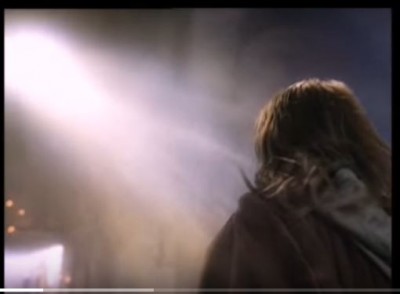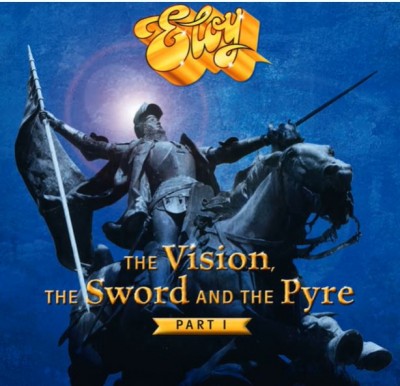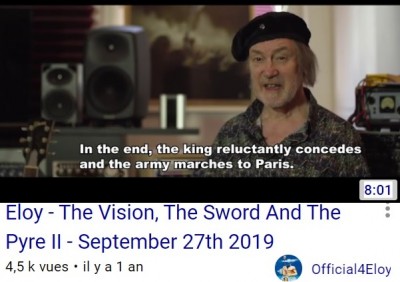Viewpoint: Regions of Europe: the Alsatian case
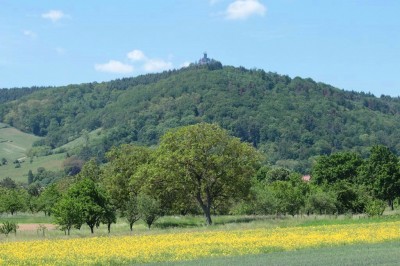
By Patrick Bracker
----------------------------
( ACM : "NewsViewPoint" Columnist Patrick Bracker seeks a revival of the Historic "Alsace" Region, as Bridge between Nations in Europe, criticizing the 2015 choice for a new, "Great East" Region, shortly before the forthcoming French Regional Elections. This represents his Personal view, (on the occasion of a relevant Collective Meeting near High Koenigsburg Castle), and Not necessarily that of "Eurofora".
F.ex., among various other points, (after having Criticized the 2014-5 Abolition of Alsace, See : http://www.eurofora.net/brief/brief/alsacenotoalcaponearea.html), we have already Published that many find Interesting also ...Both realities, including for Bridges between Nations in Europe, (where the Franco-German core obviously is the Key, particularly after UK's BREXIT, but also from the De Gaule - Adenauer link). So, we naively Hope that our French friends will manage to find a way to Combine the Advantages of Both ("Alsace" and "Great East"), in an adequate way. In such Direction, an Artistic Symbol of a Strasbourg - Reims Historic Link, is ... Joan of Arc herself, Born at nearby Lorraine and active particularly at Reims, on whom also a German Rock Music Group of quality, as "Eloy", has created a sympathetic work, (as usual for them : in English, a language of Franco-German Synthesis : Enjoy Infra ! ). By the way, perhaps something Bigger than expected might Emerge in the forseable Future from this Controversy : Naturaly, with a Right, Ambitious "Vision", as Eloy evoked nowadays (2017 + 2019 and well Beyond, towards a New European Horizon, with No more Fake Europeans, But towards Real Europeans : at the Core of Joan's Legacy)...
--------------------------
Regions of Europe: the Alsatian case
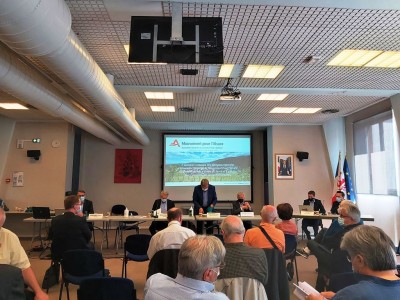
Within the framework of European construction, the perspective of the Europe of the regions represents a fundamental link between the authorities and dimensions of the territories: local, regional, national, European, cross-border and international.
The region allows a structural and human interface between the various organizational layers of a state, between the local and the national, and constitutes a bridge between nations when these regions are located at the borders of the member states of a multidimensional organization such as Europe. One understands here the importance of the bilateral cross-border relationship and the supranational dimension or extraterritoriality. These structures include specific objectives while combining complementary with their members.
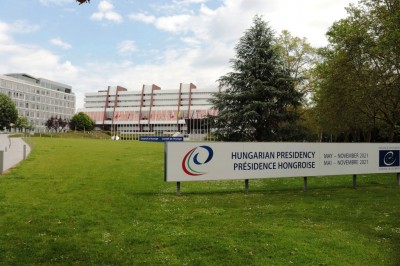
The organizations of the Council of Europe, the CLRAE or the European Union, the Committee of the Regions, the CEMR, respond to these multifactorial dimensions in the continuity of the member states. These internal organizations provide in principle the impetus for progress between the Member States through these regional and local levels.
We know that bridges are one of the logistical issues to be destroyed during real wars. In view of its experience, Europe, on the contrary, builds bridges between member states and external relations. At the intra-European level, bridges are also partnerships, twinning, and cross-border regions. Joint projects and activities of civil society, universities, companies, or shared policies allow for meetings, and to get to know each other. Open-mindedness allows bridging the gaps of ignorance or distance. Let's build bridges!
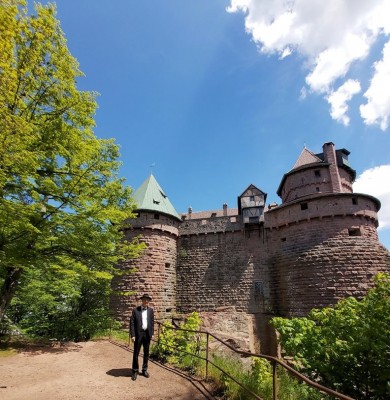
For example, with regard to the Council of Europe's Charter of Local and Regional Self-Government, the reform of the regions in France in 2015, carried out in an unfriendly and authoritarian manner without respecting European law by the government concerned, in no way corresponds to the state of mind intended by the founders of the European project, whose stakes have been well defined since the beginning, after the war. Moreover, the internal law was seriously undermined, since this reform did not respect the concept of equal treatment between regions, even though it was a founding constitutional act of the Republic.In addition to these facts,there was a cynical denial of the anthropological reality of certain regions of this country. The case of Alsace is a flagrant example, it is distressing to note that the decision-makers concerned, did not show respect for the history, nor for the population and the families of this region.
One will remember the opposition of the Senate to this reform which limited the number of regions to 13 instead of 22, while the upper house of Parliament proposed 15 regions. The majority of local elected officials as well as the population in a proportion of 80% were opposed to it. To this day, the majority of the population is still opposed to it at nearly 70%. And one evokes the democratic deficit or the notion of confidence!
In this context, we can also ask ourselves at the local level what were the motivations that pushed the creation of euro-metropolis, too big and destructive of the real estate, environmental and natural quality for the small region of Strasbourg. Is there a complementarity or a will to harm, and if so, for which objectives? Indeed, the European project is also a project of human dimension and quality of life, compared to the size of the big capitals as Berlin, Brussels, Paris, Roma... in relation to these great capitals, the human and geographical dimension of Alsace does indeed correspond to a human dimension of proximity and quality, in a way a laboratory of quality and happiness at the European level since 70 years...Actually the new mega-region named Grand Est seems far of the game.
Obviously, in a European or international perspective, this situation would have serious implications, since the situation in this region has been well known for a long time, and in particular the sufferings and bruises caused by wars or periods between wars when indelicate leaders showed contempt for the local level.
The techniques of totalitarian or contemptuous manipulation of the people are however outdated by recent developments, even if there is a hint of attempts by powers with limited competences in time and in the human domain. In all these situations there are technical errors from the institutional point of view, but above all there are mistakes from the point of view of human values, such as free choice or respect for the living being.
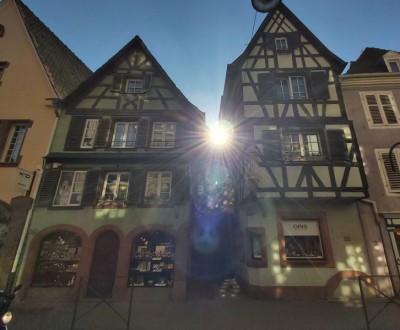
With regard to this fundamental problem, there are intelligent reactions. It is the case of the Alsatian regional reality defended by the Movement for Alsace under the leadership of its President Senator André Reichardt. The open-mindedness of this apolitical movement, symbolized by a large gathering of currents of thoughts, allows the meeting of points of view with different angles of reflection and represents a factor of appeasement of the tensions met because of this process with the forceps carried out during this reform of the regions. The regional elections that will take place in June 2021, six years
after these events, may give orientations to the decision-makers.
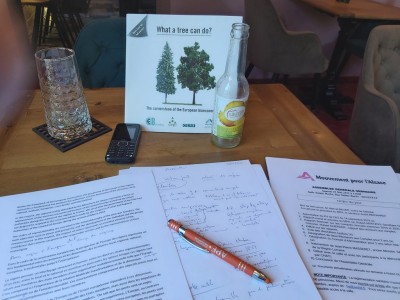
-------------------
It will be recalled that the government of the time had not deigned to respond to the recommendation made by the Congress of Local and Regional Authorities of the Council of Europe during the session of March 2016. Yet France had ratified the Charter of Local and Regional Self-Government... The diplomatic issue is also engaged by thi situation. Our international colleagues remain courteous; they are no less duped by the situation. This can naturally hinder or even prevent inter-state or international transactions, or problem solving.
The issues of supranationality and extraterritoriality, as well ontology, are a driving force in the initial philosophy of the post-war founders. The main objectives such as peace, prosperity and the development of the individual and groups in their quality environmental context remain relevant. In this respect, respect for values is an essential element of the trust that citizens can place in responsible entities and representatives.
In the end, this notion of respect is a basic instrument for any form of harmonious development of our societies, individuals and groups.
The restoration of Alsace as a region represents a European challenge.
Patrick Bracker
--------------------------------------------------------------------
Régions d’Europe: lecas alsacien
Dans le cadre de la construction européenne,la perspective de l'Europe des régions représente un lien fondamental entre les instances et les dimensions des territoires: local, régional, national, européen, transfrontalier jusqu'à l'international.
La région permet un interfaçage structurel et humain entre les diverses strates organisationnelles d’un état,entre le local et le national et constitue un pont entre les nations lorsque ces régions sont situés aux frontièresdes étatsmembres d’une organisation multidimensionnelle telle quel’Europe. L’on comprend ici l’importance de la relation bilatérale transfrontalière et de la dimension supranationale ou de l’extraterritorialité. Ces structurations comprennent des objectifs précis tout en combinaison complémentaires avec leurs membres.
Les organisations du Conseil de l’Europe, le CPLRE ou de l’Union européenne, le CdR,la CCRE, répondent à ces dimensions multifactorielles dans la continuité des Etats membres. Ces organisations internes apportent en principeles impulsions pour le progrès entre les Etats-Membres grâceà ces niveaux régionaux et locaux.
On sait que les ponts sont l’un des enjeux logistiques à détruire durant les vraies guerres. En regard de son expérience, L’Europe, au contraire construit des ponts entre les états membres et les relations extérieures. Au niveau intra-européen, les ponts sont aussi les partenariats, les jumelages, les régions transfrontalières. Les projets et les activités communes, de la société civile,universitaire, entreprises, ou de politiques partagées permettent les rencontres, et de se connaitre. L’ouverture d’esprit permet de combler les lacunes des ignorances ou des distances. Construisons des ponts!
Pour l’exemple, s’agissant de la Charte d’Autonomie locale et régionale du Conseil de l’Europe, la réforme des régions en Francemenée d’une façon inamicale et autoritaire hors le respect du droit européenpar le gouvernement concerné ne correspond en rien à l’état d’esprit voulu par les fondateurs du projet européen,dont les enjeux sont bien définis depuis le début, après-guerre. En outre le droit intérieur fût sérieusement écorné,puisque cette réforme ne respectait pas le concept d’égalité de traitement entre les régions, pourtant acte constitutionnel fondateur de la République. Il se rajoute à ces faitsune négation cynique de la réalité anthropologique des régionsde ce pays. Le cas de l’Alsace en est un exemple flagrant, il est navrant de constater que les décideurs concernés, ne firent preuve d’aucun respect de l’histoire, ni de la population et des familles de cette région.
L’on se souviendra de l’opposition du Sénat à cette réformequi limitait le nombre de région à 13 au lieu de 22, tandis quela chambre haute du Parlement proposait 15 régions. Les élus locaux en majorité ainsi que la population dans une proportion de 80% y étaient opposés, et le reste encore en majorité à près de 70%.Et l’on évoque le déficit démocratique ou a notion de confiance!
Dans ce contexte, l’on peut se demander également au niveau local quelles furent les motivations qui poussèrent lacréation d’euro métropole, trop grandeet destructrice de la qualitéimmobilière, environnementale et naturelle pour la petiterégion Strasbourgeoise. Y va-t-ilune complémentarité ou une volonté de nuire, et si oui, pour quels objectifs? Eneffet, le projet européen est aussi un projet de dimension humaineet de qualité de la vie,par rapport à la taille des grandes capitales comme Berlin, Bruxelles, Paris. La dimension humaine et géographique de l’Alsace répond bel et bien à une dimension humaine de proximité et de qualité, en quelque sorte un laboratoire de qualité et de bonheur au niveau européen depuis 70 ans ... Actuellement la mega-région nouvelle Grand Est semble être loin...
Evidemment dans la perspective européenne ou internationale, cette situation comporterait des incidences sérieusespuisque l’on connait bien la situation de cette région depuis longtemps et notamment les souffrances et meurtrissures provoquées par les guerres ou des périodes d’entre guerreslorsque des dirigeants indélicats firent preuve de mépris du niveau local.
Les techniques de manipulations totalitaires ou méprisantes des peuples sont pourtant dépassées par les évolutions récentes, même s’il existe un relent de tentatives par des pouvoirs aux compétences limitées dans le temps et dans le domaine humain. Il y a dans toutes ces situations des erreurs technique au point de vue institutionnels mais surtout des fautes aupoint de vue des valeurs humaines, comme le libre choix et le respect de l' etre vivant.
En regard decette problématique de fond, des réactions d’intelligence existent. C’est le cas de la réalité régionale alsacienne défendue par le Mouvement pour l'Alsace sous la houlette de son Président le Sénateur André Reichardt. L’ouverture d’esprit de ce mouvement apolitique, symbolisé par un large rassemblement de courants de pensées, permet la rencontre des points de vue avec différents anglede réflexion etr eprésente un facteur d'apaisement des tensions rencontrées du fait dece processus au forceps réalisé lors de cette réforme des régions. Les élections régionales de juin 2021, 6 ans après ces évenements, pourraient offrir des orientations aux décideurs.
L'on rappellera que le gouvernement de l’époque n'avait pas daigné répondre à la recommandation faite par le Congrès de Pouvoirs Locauxet Régional du Conseil de l'Europe lors de la session de mars 2016. Pourtant la France avait ratifié la Charte d’AutonomieLocale et régionale...La question diplomatique est engagée également par cette situation. Nos collègues internationaux restent courtois, ils n’en sont pas moins dupes de la situation. Cela peut naturellement gêner, voire empêcher des transactions interétatiques ou internationales.
Les enjeux des supranationalités et d’extraterritorialités, ainsi que de l' ontologie, sont un moteur dans la philosophie initiale des fondateurs d'après-guerre. Les objectifs principaux comme la paix, la prospérité et le développement de l'individu et des groupesdans leur contexte environnemental de qualitérestent d’actualité.A cet égard le respect des valeurs représente un élément essentiel de la confiance que les citoyens peuvent accorder aux entités responsables et à leur représentants.
Au final, cette notion de respect est un instrument de base pour toute forme de développement harmonieux de nos sociétés, individus et groupes.
La restauration de l’Alsace en qualité de région représente un enjeu européen.
Patrick Bracker
-(*) Eloy - Jeanne d'Arc (Comp. Supra)
https://www.youtube.com/watch?v=PK4Jjg3-hWg
----------------------
https://www.youtube.com/watch?v=vLofM9eGS0M&list=OLAK5uy_ly65UeVEniXYA7rHWmhFSP_4FxUSyshNQ
+ Lyrics : http://eloy-legacy.com/eloy.php?Area=music&Sub=pyre1&PHPSESSID=hs94vmojqtsbasv631dpg8lai1
---------------------------------------------
https://www.youtube.com/watch?v=vk1utlg3ykw
+ Lysics : http://eloy-legacy.com/eloy.php?Area=music&Sub=pyre2&
-------------------------------------------------------

http://eloy-legacy.com/eloy.php?Area=music&Sub=pyre1&PHPSESSID=hs94vmojqtsbasv631dpg8lai1

http://eloy-legacy.com/eloy.php?Area=music&Sub=pyre2&
+ FULL LYRICS (of 1 + 2), in German, French, and English :
http://www.eloy-legacy.com/download/VSP_Lyrics.pdf
------------------------
https://www.youtube.com/watch?v=wpH2A5Pul5M
***
EU on Gas Crisis : Ship Transports to bypass Pipeline Blockades ?!
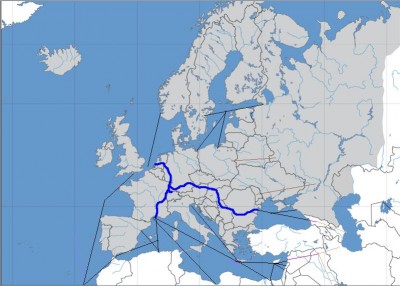
The importance of Ship transports in order to guarantee EU's Energy independence, against the risk of more ..."Pipeline Blockades" by 3rd, Non-EU Countries of transit, simply by closing a tap, started to be felt by Top EU actors.
- "That's right : No blackmails or threat to block pipelines should be made for Political aims", replied to "EuroFora" France's New Minister for EU affairs, Bruno Le Maire, shortly after Turkish Prime Minister Tayip Erdogan's astonishing threat in Brussels to block the non-existent yet "Nabucco" gazoduc project if the EU insisted to ask Turkey to fullfil its commitments.
- "Even if Nabuco is an important project, there are also others, (as "Sourth Stream", etc), or even Ships' transport, with new Technologies of liquified gas, etc. Thus, it's preferable to diversify Enerhy Transports, as much as possible, in order to achieve greatest Security and Independence in Europe's Energy supplies", Le Maire added.
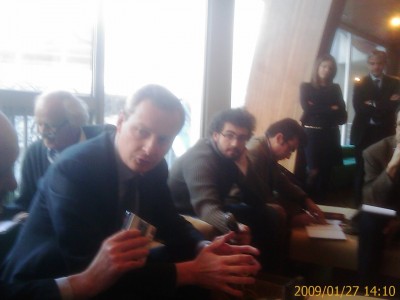
Meanwhile, the secrets of sudden phone calls by Romanian President BASESCU to Russian Prime Minister PUTIN during the Ukranian pipeline crisis, were not openly revealed by Romanian MEP Jean MARINESCU, EPP Group's vice-Chairman, while discusssing, in EU Parliament in Strasbourg, with German MEP Elmar BROK a Moscow Summit due to try to solve the pipeline problems.
But Basescu is well known as a strong supporter of Ship Energy Transports through Seas and Rivers, mainly via the Black Sea - Danube and Rhine Rivers' route, that he was 1st to cross with a big boat, since 2001, as former Minister of merchand fleet, as he replied to an "EuroFora" question, at an earlier CoE Press Conference in Strasbourg.
Thus, now, a series of EU politicians started to question a lobby's attempts to exploit the current Gas crisis between Russia and Ukraine in order to impose to the EU an old plan for a too long, expensive and vulnerable "Nabucco" controversial pipeline zig-zaging through troublesome Turkey, notoriously exposed to earthquakes and conflicts.
The move went beyond the competition by a new project for a "SouthStream" pipeline from Russia via the Black Sea to Bulgaria, and then Greece and Italy, or Serbia, Hungary and Austria : 90% EU Members".
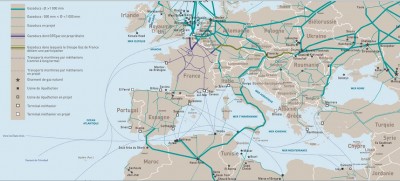
Various Top EU Politicians, questioned by "EuroFora", agreed that Gas SHIP TRANSPORTS should be urgently developed as a way to face the current Gas Pipeline crisis, and avoid to fall to the trap of any lobby which might exploit it in order to impose another Pipeline, through other troublesome 3rd countries, even longer, more expensive and vulnerable.
The move started recently, after a Franco-German Summit between German chancelor Merkel and French President Sarkozy, who stressed that the current Gas Pipeline incites Europe to "diversify Energy Transports".
,
- "There is a series of issues to ensure EU's Energy Independency, and this would very probably include also the development of SHIP Transports", added, agreeing witth a "EuroFora"'s question, Sarkozy's Spokesman on European issues, Pierre Jerome HENIN
- "The necessary Diversification of EU's Energy imports concerns not only the Sources, but also the Routes and Means of Transport. One of them certainly are Ship transports of oil and mainly gas, and EU has prepared programs (fex. TENS) to fund both Ships and Terminals for Gas Liquification", replied also to "EuroFora" the President of EU Parliament's Political affairs Committee, Polish ChristianDemocrat/EPP MEP, Jacek SARYUSZ-WOLSKI.
- "Pipelines are OLD-fashioned. The Future belongs to Gas, and in particular to the LNG technology. The biggest Gas deposits in the World exist not only in Russia or Iran, but mainly around Quatar. So that Ship transports of LNG are certainly to be developed", replied also to "EuroFora" the experienced Finnish MEP Esko SEPANEN, member of EuroLEFT Group's Bureau.
- "You are right : We (EU) must consider both the Costs and the VULNERABILITY of each kind of Energy Transports" :
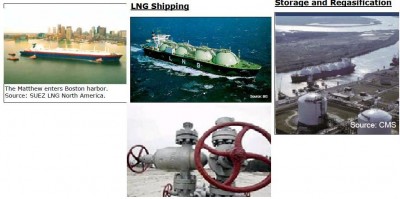
- "PIPELINES CAN BE totally BLOCKED by simply CLOSING A TAP, in case of any "Crisis", as we see now in the Russia-Ukraine row", replied EPP Group's Foreign Affairs Spokesman, Spanish MEP Jose SALAFRANCA to "EuroFora" Question, if he found that EU must avoid to be anew dependent to a Pipeline crossing any 3rd Country, which can be easily closed, under any pretext, (while Ship links cannot be easily sabotaged or blocked 100%)...
- "In consequence, Ship Energy transports should be also developed" by the EU in order to guarantee Europe's Energy Safety through Diversification, concluded Salafranca
- "It's certainly an IMPORTANT issue the Diversification of Routes and Transports : In Future, our (EU) Priority must be to diversify our energy supplies by all means, including SHIP Transports, in order to ensure Europe's Security and Independence", replied also to a similar "EuroFora's" question the President of Latvia, Valdis ZATLERS.
Last, but not least : Compared COSTS :
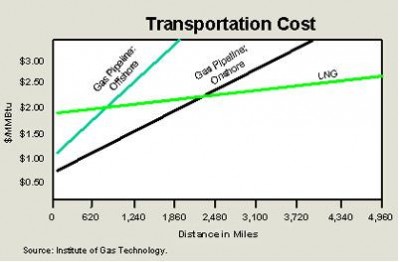
According to American Experts' sources, the cost of a Gas Pipeline becomes more and more expensive compared to that of Ship transports of LNG, particularly for long Distancies, starting from some 2.000 kms
This obviously proves that the controversial old "Nabucco" plan is too costly, since it should extend for more than ..3.300 kms (!), making Ship LNG transports cheaper..
In parallel and concording moves, EU Council and Commission presented recently a series of measures to ameliorate the working conditions of Seafarers.
EU Parliament already endorsed a Directive on an Agreement brokered by Shipowners and Transport Workers, hailed by Greek EuroMP Mrs Maria PANAYOTOPOYLOS-CASSIOTOU :
- "The Seas around Europe are becoming more and more important for International Trade, and many Young People should see their Future in good jobs at the Shipping industry", she said.
Such moves could also contribute to a social Civilisation at the Seaside (and Riverside), able to revitalize Europe's Historic Cultural links to the Sea (and Rivers)", she added.
Typical of EU's Sea - River links, MEP Maria Cassiotou was born at Greek Island, but now lives with her Family close to Rhine River..
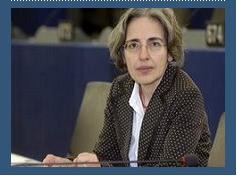
EuroParliament 1/2020: European sociology, carbon costs, realities, experimentations

EuroParliament 1/2020: European sociology, carbon costs, realities, experimentations
February 1st 2020
----------------------------------
Viewpoints by Patrick Bracker
------------------
(NDLR: Viewpoints express the Opinion of their Author,
and are Not necessarily Endorsed by "Eurofora".
+ A Translation in French is provided hereafter).
------------------------------------------------Warning: this attempt to summarize a well-filled session does not replace the full reality of the content of the proceedings, some of which can be found in the verbatim reports of the European Parliament. The documents are published there in the 27 official languages of the EU. I have added a few critical extensions based on my fifty years of European and international knowledge and experience. BP
At the beginning of the session, the assembly marked the minute of silence added to the customary condolences expressed by President Sassoli to the families of the victims of the Iranian crash. Then the agenda was quickly adopted
For this resumption of the plenary session in 2020, the European Parliament addressed many and varied themes. Topics at the forefront, such as bushfires in Australia, the programme of the Croatian presidency, the implementation of citizens’ rights under Brexit, the Iran-Iraq situation, or self-criticism on conflicts of interest in the post-mandate period were included.
Other topics concerned the investment plan presented by the Commission for a sustainable Europe, the funds for a just transition and the roadmap for social Europe. The subject of common security and defence was discussed in depth during the joint debate on the Danjean - McAlister reports. MEPs also debated cross-border crime and its impact on freedom of movement.
The presentation of the 2018 annual report on the state of democracy in the world and the positioning of the EU, followed by the debate on the conference on the future of Europe, provided food for thought in the search for values in the current general context. The 2019 report will be presented in spring 2020. For some of these conferences one can ask question their real usefulness, the time spent, and their carbon costs, given that the needs of Europeans are well identified. The policies seem to be running in a loop at the local, national and European levels as well!
Regarding the debate on bushfires in Australia, over and above the bitter reality of the loss of human life, animals, property, land and biodiversity, MEPs noted that these fires released 200 million tons of CO2 into the atmosphere. The MEP Bijoux of the Renew group hovers 17,000 km away shouting: "can you hear this cry, can we hear the pain of the families, the suffering of the victims, the cries of a billion charred animals", while his group seems not to hear the cry of the birds, fauna and flora massacred in our great French megalopolises, and even less the sound of the suffering French people, nor that of the peaceful demonstrators who were massacred during the yellow vest-like expressions by a disoriented power with an authoritarian tendency... Even the firemen are mistreated under the gaze of the Elysée and Matignon! It's true that it's worth opening one’s beak when big contracts are at stake, small people...
In addition to the disappearance of rare animal species, a toxic cloud has crossed the ocean towards South America. 183 arsonists have been arrested (some linked to Islamic fundamentalism) announces MEP Bruna of the ID group. The situation of these fires is not new, dating to at least 1987. Among the causes is water management, the responsibilities of local environmental lobbies who refuse to clean up the bush. Indeed, the law in Australia has devolved federal responsibility to local decision making and thus the Greens would prevent any necessary action. Another reason comes from the intensive cultivation of eucalyptus, a tree that releases an oily resin at 40°C. The resin feeds the fires as well as the lightning during thunderstorms. This problem also exists in Spain and Portugal. During this discussion, some would like to make sustainable development binding. Others would like to extend the Rescue system to the outside world, to strengthen the capacity of Europe to deal with natural disasters.
This is a central element of the Junker Committee and has been in existence for a long time, since being included in 1995 in the European warning system in the event of natural disasters or major risks... (Pan-European Space Approach 95/96 BP) The same applies to the climate commitments of OECD countries in 1994. Time is marching on; the problems remain, and nations and institutions seem to discover these realities with each generation of policies. But new conferences and discussions must be created to rediscover the subjects that are so well known! Look for the mistake...
Europe could play a coordinating role over time, rather than costly, sporadic and ineffective actions. What a carbon cost to all these mistakes as the one or the president of the republic: as soon as the COP 21 was ratified in Paris, he flew around the world deserving the nickname at the time: "the flying Hollaender". Since then, high-level elected officials from all over the world have not failed to pollute our planet, either by their travels, their decisions or the bombings. Is this chaos and division desired or even planned by the leaders? One may ask the question. To what end?
Another serious issue has not been addressed by MEPs and even less by the moralist of Renew: Australia's purchase of 12 submarines from France for 50 billion dollars! Indeed, a double link with climate change and fires could have been noted: the pollution of the construction, its co2 cost, the use of these materials polluting the oceans. But above all is the fact of not acquiring materials intended to fight the fires that have been regular for years in the southern hemisphere. Canadairs, fire trucks, training of personnel and formation of fire crews would undoubtedly have prevented much damage. Moreover, it would have avoided the displacement of firefighters coming from far away, at what carbon cost? We can see here that governments do not always have an interest in serving their people, or in taking care of biodiversity. Nothing new under the sun there either, unfortunately. The aspect of this strategic choice seems questionable.
From the very beginning of the debate on cross-border organized crime, the lack of harmonization and cooperation between the justice and/or police systems has been heard. A European FBI is called for, some MEPs have been regularly calling for such a structure for a long time. In the face of public order disturbances it is recalled that states have the right to re-establish border control while continuing to support the positive elements of Schengen. One MEP does not understand that Europe does not harmonize the fight against drugs that enrich crime. The Commissioner mentions the existence of 5000 organized crime groups, a European intelligence service which would be welcome, and the exchange of concrete information would make it possible to dismantle networks that kill people. Strengthening Europol and Eurojust, closing legal loopholes while avoiding a differentiated application of the law, would be solutions to move forward in the face of the scale of the task, and to preserve European freedoms.
The important issue of the rights of European citizens in the context of the withdrawal of the United Kingdom has allowed for some clarifications and questions to remain, also revealing some fears among some MEPs about the application of the EU-UK agreement. The situation concerns 4.5 million people: 3.5 Europeans in the UK and 1 million British in Europe. The Chair of the committee announced on entry that the withdrawal agreement offers comprehensive guarantees of rights to European citizens and contains the reciprocal obligations of the EU and the UK.
With regard to residence permits, progress has already been made for 2.5 million Europeans. However, there are still some problems, notably the proof of presence required, even though some of them have been living there for 20 to 40 years. The EU wants continuity for citizens on both sides. MEP Verhofstadt calls for automatic recognition of citizens before signing a future agreement and for a physical document to be obtained rather than an email, which has been described as insufficient! He proposes that citizens representatives should be able to participate in the independent supervisory authority. MEP Lamberts raises a concern that there are administrative difficulties and that the UK government has the option of abolishing the independent supervisory authority. It should be remembered that this authority is used by the Commission to monitor EU state aid. He emphasizes that the EU is a power that is a friend of the U.K., and citizens must be treated fairly.
Other members talk about the risk of social dumping or would not want to give more rights to some than others. Gonzales -Pons stands out and says to the British: “stay!” Kirton-Darling recalls the red line of protection for citizens that the founding fathers wanted, and Laeners reminds us that even Farage agrees that we should preserve the reciprocal rights of citizens. Voaden mentions the cases of Emmanuelle, whose residence status was refused even though she filled out an 85-page document, has been a teacher for 20 years, is married on the spot, her children were born in the UK and she pays her taxes... To conclude this lively discussion, Barnier recalls the state of the law and confirms the introductory words of von der Leyen. For the resolution, he called for a large majority vote on which Verhofstadt representing the EP will be able to rely at the London conference following this session.
The Vice-President of the Commission and High Representative of the Union for Foreign Affairs and Security Policy, Bonnel Fontelles summed up the debate on the situation in Iran-Iraq following the recent escalation of tensions in a well-chosen sentence, which is worrying people's minds, in his own way: "It has been a whole range of points of view, all very interesting but very different. If I had to describe the Parliament's position to someone after listening to you, I would not be able to express it, because it ranges from white-white to black-black, and there are very different points of view on a crisis that is very dangerous for all of us, as you have all agreed".
However, MEPs have expressed a variety of views, sometimes with interesting nuances, on the situation in these countries. They have denounced external causes, such as the illegal action of the US President or NATO, or internal Iranian responsibilities, such as the violence inside the country or the recent aggression against the US embassy in Baghdad. The pretexts are real, regular, varied, for the same purpose of chaos. The nuclear issue, the real politics of trade has been mentioned and we have heard a proposal for an autonomous EU policy towards Iran, without dependence.
EPP MEP Zovko summed up that all means to calm the game would be welcome, and to open diplomatic channels. Green MEP Hahn said that the assassination of a person goes against international law. One needs to ask which is correct and which requires a deeper look at these deviations over many years. A special case is that of the murdered scientists, looking at the possible scenarios: would there be a link between these cases and the shooting down of the plane? Were there Western scientists on board? She reiterated her response to the blue card shown by Tomac of the EPP group, stating that the assembly of the European Parliament does not have a judicial role. Lewandowski, who has travelled to Iran, recalls the global non-proliferation strategy and that 80 million Iranians want to live under the principle of peaceful cooperation beyond the current powers that be. It should be noted that the Deputy Foreign Minister of Iraq had come to consult the External Action Service of the EU at the beginning of the session.
Over and above the projected display of inter-institutional cohesion at the beginning of the term of office, the response of the EU High Representative shows the difference in mentality between the institutions and suggests that harmony between the three institutions is far from being guaranteed. This undoubtedly motivated the choice of the candidate. Indeed, what is the guideline if one does not listen to the voices of one or the other, a form of technocratic dirigisme? In the service of whom or what?
This way of responding to an assembly shows the opacity of diplomatic channels: the assembly expresses itself, the Council understands what it wants or does not want, and as a result the people's assembly is not heard. It is an old classic relating to the exercise of power. It is not surprising that chaos is not settled under these conditions. One can always ask who benefits from disorder. Some answers exist.
The King of Jordan addressed parliamentarians. His negative discourse revealed a verbal violence projected in the supposed scenarios of "total wars", but he nevertheless ended his speech with a few positive words, preferably in favor of peace.
This one-sided discourse remained without dialogue with the assembly of elected representatives: no questions, no answers. Nevertheless, the deputies politely applauded the king whose country is under enormous pressure. It seems that speeches tinged with negative nuances and the uses of the transfer technique are very fashionable among many officials. Yet these old methods of governance are outdated and do not solve anything!
There are precedents for this kind of one-sided situation; this form of theatricality seems irrelevant for democratic dialogue in the European context. Moreover, all these matters fall within the remit of the UN, with the EU and the MS playing costly duplication, to the detriment of our European citizens. It is time for the UN to stop transferring its incompetence to Europe.
Prime Minister Plenkovic presented the agenda of the Croatian Presidency in several main blocks: a developing Europe, the single market and promoting digitization, investing in innovation and research, quality and lifelong education, connectivity and achieving social, economic and territorial cohesion. The agenda also advocates bringing citizens closer together through education, culture and sport. An Europe that protects, the role of the Union in the world in a perspective of mutual respect, in particularly with China, India and the Russian Federation. Particular attention would be paid to the Green Pact, financing, mobility 2050, climate, the digital revolution, with the aim of improving citizens living conditions. In the context of this programmatic discussion, President Von der Leyen referred to the problems related to the destructive trends Europe is facing. She wished to focus on modernizing the budget and putting the Green Pact into action, even 24 hours a day.
MEPs as a whole discussed the MFF -Financial Framework Multiannual-, social pillar, European unity, security, Frontex, the climate revolution or enlargement to the Western Balkans. For the MFF, the persistent demand for a strong budget is renewed with the introduction of own resources. The quality of life of citizens seems to remain a priority for most of them. A few dissenting voices were raised on corruption or human rights issues in relation to Croatian police violence against migrants, or taxation.
MEPs extended this package of proposals from the Croatian Presidency; stressing the demand for social pillars - action plans -: an action plan for minimum wages and an action plan against poverty with the introduction of a minimum income. As regards the request to send a strong signal to the countries of the Western Balkans, there is a contrary echo, since some consider that the enlargement of the countries is marred by corruption or by the networks of Islamist terrorism. The contrary echo is a call for caution on these serious issues.
The post-Brexit period will have to be managed with the 10% decrease in the European population and confidence in the future of Europe, in view of the political events developing in several member states. A regular criticism resurfaces regarding the increase in military spending, when it should rather be invested in cohesion, regions, education, science, health...
These voices are relevant to Europe's original plan to emerge from World War II and to establish a mechanism to prevent a return to a chaotic past. The qualities of life, healthy food, care, especially occupational cancers, scientific research or giving European perspectives to neighbors remain the concerns of elected representatives. This is clearly a laboratory of ideas, a source of wealth and societal development for the EP. BP
This Croatian agenda partly continues the roadmap already printed during the Juncker era. In the face of these great ambitions, we can ask ourselves why young people are leaving this country and open up a debate on the adequacy between the thoughts, words and actions of those responsible for business. The budget or the organization is not everything.
Concerning the discussion on the conference for the future of Europe, Sassoli referred to the fact that several months of reflection on the project for the conference were based on a request from the EP, subsequently accepted by Ms. Von der Leyen. The Council was seeking inter-institutional balance. According to Commissioner Suica, "Europe of Daddy no longer works... and the citizens would like something else... Then she mentioned cooperation between the institutions, the Member States, the Economic and Social Council and the regions. She proposed two axes as a working perspective: the political debate, and the institutional aspect, such as the election of the President of the Commission and cross-border lists. We must listen to the citizens, with a view to launching a wave of reforms.
In short, nothing new under the sun since daddy's Europe. This has proved to be effective in the priorities of peace and prosperity for our states and fellow citizens! It will be remembered that the assembly of MEPs had refused to vote in favor of a transnational list in February 2018. It was in the context of the exit of the British and the reallocation of seats, as well as the conditions for the election of the Presidency of the Commission in 2019. This is when the so-called system of the "head-of-list candidate", hypocritically brought up again since then, was rejected. Should the British seats be reallocated to State Members MEPs or should these finances be used for the good of the citizens? It seems to me that the reallocation of British seats to other MEPs would be a mistake since there are fewer European citizens as a result of Brexit.
The current affairs debate on Wednesday touched on a sensitive subject: the distortion of European history and memory of the Second World War.
Brjnac, representing the European Council, testified that despite the positive advances and common values of Europe, she witnessed a war in Europe in her country in 1990, failing to mention that her country was not a member of the EU at the time, (application for membership in 2003, accession 2013). In 1990 this country was far from the prospects of European values. Taking credit for history created by others without naming them is a form of distortion by omission.
This raises a question, war and how to avoid it. Avoiding it means not falling into the trap of projecting the enemy: us and the others, the populists, the nationalists, -without adding the patriots who resemble them under the guise of the exaggerated flag policy-. This issue is particularly discernible because of the current regressive drift in European nations, including the countries of origin. Indeed, the overvaluing of flags is a mass mental manipulation that Caesar knew well: bread and games. The lever of sports, highlighted by the media and advertisements, shows these paths of valorization and commodification of the human being. Is it a return of conditioning or psychological reflexes into the neurons of the collective conscience? Politicians participate by making and chasing their "heroes" of the moment, instrumentalized for objectives that are different from the fundamental value of sport.*
For Commissioner Jourova, history is a collective to be shared. She distinguishes between the right to different opinions but the falsification of facts must be rejected. She briefly recalled the Ribbentrop-Molotov pact and the sharing of zones of influence in the time of Hitler and Stalin. They question why these regimes existed and grew, specifying that the EU is based on the end of WWII. Mr. Goerens argues that dealing with the past is a delicate matter, with the addition of misinformation and ignorance.
BP - To these basic observations, one can add the realities of the military archives of the countries concerned, which are not accessible before 2050, or even the archives of the Gestapo and European countries, recovered by the Red Army in 1945-46. Also included would be special archives, which sometimes have been subject to negotiations during the Cold War. Other archives would be the exchanges with de Gaulle in 1966. All these undisclosed data could show a puzzle different from the reality of the Second World War than most people can understand, especially when we go back to the period in question.
It is also at these levels of international relations that Europe has a role to play in working for peace and avoiding culpable returns to the past; ensuring that peace works for our nations. In the 21st century, it is time to move away from these concerted actions that organize wars to destroy the lives of many, while profiting a few! –
Butikofer believes that it is not the role of the EP to examine history; it is the role of historians. It is rather to defend the facts, and to play the role of appeasement. He wonders whether there is not an attempt to set a target to change reality. It is true that the new readers of the incomplete story were not there and did not experience the horrors of that period.... Other Members say that there is no attempt to establish the truth, as is the case with the murders committed by the partisans in Italy: the murdered children, the raped women are passed over in silence.
BP - These realities also exist in other European countries, for example in France: as a reminder, an Alsatian woman was murdered and probably raped and tortured in the Dordogne by the local maquisards in 1944. War creates pretexts to serve human baseness, unjustified and inhuman cowardly behavior. There seems to be a correspondence between the monsters, -NMR?- . This case was revealed in 2016 because a miserable person who had not opposed the violence, 72 years after the fact, at the age of 90, felt the need to ease his conscience after the death of their gang leader.-
-There is still a real role for Europe: to combat these evil attitudes of hatred, thoughts, words and deeds, over and above the suffering and injustice, which is no small task when we see the human misery. – BP
BP - For 70 years Europe has managed to find ways to avoid falling back into these traps of evil. Nowadays many greedy or violent leaders should think about this before doing bad things, either within their states or internationally. The range of wrongdoings committed being well provided and identified, it still seems for the moment that the structuring of the European construction, represents the extension of our nation states, and resists such destructive schemes to keep the course of a project of construction, development and human progress. Indeed, the nation state is not the ultimate goal of the life of an individual or a group of individuals; it is rather a springboard for progress for the common good and human civilization: the German or French baker in the thirties had a similar preoccupation as all other Soviet or American bakers, to satisfy daily life. Alas the forces of hatred had succeeded in decoupling human sensibility from their humanity by the invasion of fear, doubt or hatred and rejection of the other. Such attempts exist today in Europe, in our nations or in our institutions. Just listen to them and see them, to correct. -
- This catalysis is interesting in order to root out the evil by remaining focused on the areas of progress: life, the breath of life, respect, free choice, understanding and intelligence, education, culture, science, health etc. These are commonly called European values. Attempts to get out of it by force, power and violence would only be the beginning of bad, heavy or destructive projects. It is Europe's role to keep the constructive way of life by opposing such attempts head-on. In this respect, the maneuver on the eastern flank of Europe is significant. The first corrective measures have been implemented during 2019, by non-visible actors, actions that are prolonged at the level of the institutions, which should be extended in the states concerned. - BP
MEP Beer of the Renew Group calls for a code of conduct to combat hate speech, as established by the Council of Europe. These are positive European values, provided that they are extended to high-level officials and power groups. MEP Cioccca from ID Group draws a parallel between the distortion of ancient and present history by asking the question: "what has changed"? -There are nuances, but it is true that there are similar patterns.
Smeriglio of the S and D Group declares: "WWII unleashed by National Socialism to assert a racial dictatorship and anti-Semitism dedicated to the Holocaust and the Final Solution. A coalition fought and defeated these Nazi demons. We cannot put the elements that led to the Shoah on an equal footing; to learn from history is to grasp the degenerative elements that led to the Holocaust, and to catch them in the present in order to fight the new forms of fascism. We should dedicate this debate to the millions of people tortured and killed in Auschwitz; it is there, among the crematoria, that the need for the European Union was born".
Ruiz Devesa underlines the angle of looking at history; we see the atrocities committed by others, but not the atrocities committed by our ancestors. Hence the need for an European history to highlight our tragedies and our good deeds done.
Yet another elected ECR member spoke of the fight against the causes of a return to extremism, such as corruption. A recall is made of the EU as a basis for peace and prosperity for Europeans.
On Thursday morning, discussions under rule 144 of international humanitarian law showed the darkness of the human soul in some parts of the world. - It makes one wonder whether the EU should not change its strategy with regard to the abominations committed by those in power, especially when the funding is European. This form of international remittances can also be the result of high levels of organized crime, which persist in time and space. It will be necessary to reflect on these demonic behaviors in the countries concerned, probably to modify certain codes. It seems that our financing prolongs the bruises and abominations of all kinds. This must stop! BP -
- In the meantime, I would like to remind you that the European priority is owed to European citizens and the quality of life for our European citizens, according to the European model, our model of economic and social progress, which is unique in the world. The grass is not greener elsewhere - on the other hand, this issue of human rights is in principle within the sphere of the Council of Europe. EU should not duplicate the work of the Council of Europe, but rather strengthen it, and let the UN do its work or develop it. -
BP - At the first debates of the week, we noted the refusal by some to answer their colleagues' blue card questions under childish pretexts, particularly during the discussion on Brexit. In the days following the blue card questions were accepted and answered. This procedure is useful for democratic discussion, especially when people have different or divergent points of view: the question allows for clarifications, or possible questioning, but also highlights shortcomings. This is one of the reasons for the existence of this procedure.
In a Blue Card question about the evidence for her claims, the Member did not reply by saying that she was relying on the claims of others! This seems curious from a representative of the electorate, while revealing a form of amateurism that should be more business-like. Progress would be necessary in the mindsets of some Members with regard to the approach to communication and knowledge. It may take time to advance such mentalities.
Moreover, the systematic refusal to reply by some parliamentary members would reveal a form of ostracism against their regularly elected colleagues. There are psychological blockages on the part of people who are supposed to be listening to each other in order to make progress in resolving the issues to be dealt with. In my opinion, these internal communication barriers border on professional misconduct, even in cases involving Brexit.
How then, in such limited postures, can we find any kind of problem-solving approach to the issues discussed during the week, such as Iran-Iraq or the human rights issues involving murder, as discussed during the session week? One extends one's psychology outwards! With a five-year term ahead of us, some elected officials should consider working together, as others have already pointed out. It is also the role of the roost presidency to provide for this, without partisan considerations.
On Thursday, during the voting session, the results relating to the Green Pact should be noted: a number of amendments are voted with a very small gap, 2 to 10% compared to the number of voters, and a number of abstentions greater than the gap. This is an observation that confirms projections made at previous sessions since July 2019.
It was an interesting observation during the explanations of vote, in the context of conflicts of interest, when Botenga of the GUE Group proposed reducing the astronomical salaries of senior civil servants and elected representatives in order to get a little closer to working citizens who do not manage to finish their month and to participate in the collective effort demanded of European citizens. If we extend this request, we should start with the Member States where the elites are often very well paid and out of touch with popular realities. This partly explains the gap of misunderstanding between one and the other. Indeed, high salaries can shift people away from earthly but also spiritual realities. It is only afterwards that this misalignment is extended to institutional levels or international entities.
Nevertheless, one cannot generalize this situation of risk, but remain attentive to the profile of the people to whom business is entrusted. A precautionary measure would be to establish political codes of ethics to reduce or neutralize the risks in the event of serious deviations on the part of managers, such as attacks on the general interest or life.
On the other hand, top salaries meet precise criteria most of the time and are deserved by those who receive them, apart from inefficient political parachuting. The fragile proposal of the member on the left will not be retained.
However, the economic problem raised by this Green member seems to me to be posed in reverse: it would be more judicious to reverse this proposal and to pull upwards on the entire salary hierarchy, including the most vulnerable or excluded populations, according to a funding grid that is tuned to the realities of spending for life.
When will there be a universal income of existence in the age of robotization and AI? The tool of finance at the service of development and humankind! It is not embarrassing that people are wealthy or moderately wealthy, what is embarrassing for our societies is that people who have a job, do not finish the month ends and others are excluded from employment, health or even society. Yet our senior officials all say that no one should be left by the wayside!
There are rational explanations for all these situations. There is no need to go back to the slavery of the past! Many elected representatives have been calling for an end to austerity for a long time. It would be wise to stop the austerity in order to make our societies progress, outside the context of chaos, the premises of which can be glimpsed and the scale tests of violent resolutions that existed ... especially during the 20th century WWI, WWII. This is precisely one of the foundations of the post-World War II: European reality: peace and prosperity for all our citizens.
It is indecent for our leaders to pretend to solve all the problems of the world, especially far from home, when they have not proven their ability to solve problems next door, their neighbors, their families, their fellow citizens! The transfer of artificial charity to remove guilt does not heal souls and does not solve problems.
Could the conference on the future of Europe already launched internally enable us to deepen this major reflection on the future of our citizens, or will it produce a technocratic model to hide the realities, consuming a high Co2 cost?
BP - There is evidence that the carbon costs of multiple trips by authorities are very high: what is the carbon cost of unnecessary travel by senior officials when representative intermediate authorities are often on site? What is the carbon cost of selling and using war materials? What is the polluting cost of the excess number of submarines? Here and there, there is a discrepancy between the words and deeds of the leaders of nations. What is the carbon cost per leader or per decision of these leaders? The densification or urban sprawl, including the creation of megacities, to the detriment of nature, fields, forests and gardens, has consequences for wild fauna and flora and their habitat. Some decisions lead to pollution or deterioration to the detriment of the quality of life for communities. It seems that business people and many politicians are not interested in these realities, preferring other nauseating priorities over respect for life!
Progress in the right direction is needed on human and environmental rights. BP
------------------------------------------------------------------------------
Extraits de la Reprise session janvier 2020 au Parlement Européen
Sociologie européenne, coûts carbone, réalités, tâtonnements
Avertissement : cet essai de synthèse d’une session bien remplie ne remplace pas toute la réalité du contenu des travaux, que le lecteur peut retrouver en partie dans les comptes-rendus in extenso du Parlement européen. Les documents y sont publiés dans les 27 langues officielles de l’UE. J’ai rajouté quelques prolongements critiques constructeurs sur la base des mes cinquante années de connaissances et d’expériences européennes et internationales. BP
En commençant la session, l’assemblée a marqué la minute de silence ajoutée aux condoléances d’usage prononcées par le Président Sassoli à l’adresse des familles des victimes du crash iranien. Puis l’agenda fût rapidement adopté
Pour cette reprise des plénières, an 2020, le parlement européen a abordé des thèmes nombreux et variés. Les sujets sur le devant de la scène, comme les feux de brousse en Australie, le programme de la présidence de la Croatie, la mise en œuvre des droits des citoyens dans le cadre du Brexit, la situation Iran – Irak, ou l’autocritique sur les conflits d’intérêts dans l’après mandat des responsables.
D’autres sujets traitaient du plan d’investissement présenté par la commission pour une Europe durable, les fonds pour une transition juste et la feuille de route pour l’Europe sociale. Le thème de la défense et de la sécurité commune était approfondi lors du débat conjoint sur les rapports Danjean - Mc Alister. Les députés ont aussi débattu de la criminalité transfrontalière et de son incidence sur la libre circulation.
La présentation du rapport annuel 2018 de l’état de la démocratie dans le monde, et le positionnement de l’UE, puis le débat concernant la conférence sur l’avenir de l’Europe nourrissaient une réflexion de recherche des valeurs dans le contexte général actuel. Le prochain rapport 2019 sera présenté au printemps 2020. Pour certaines de ces conférences L’on peut s’interroger de leur utilité réelle et le temps consacré, leurs coûts carbones, eu égard au fait que les besoins des européens sont bien identifiés. Il semble que les politiques tournent en rond aussi bien aux échelles locales, nationales qu’européennes !
Concernant le débat sur les feux de brousse en Australie, par delà le constat amer de la perte de vies humaines, animales, de propriétés, de territoires et de biodiversité, les eurodéputés ont relevé que ces incendies ont rejeté 200 millions de tonnes de Co2 dans l’atmosphère. Le député Bijoux du groupe Renew plane à 17000 km en s’écriant : « entendez-vous ce cri, entendons-nous la douleur des familles les souffrances des sinistrés, les cris d’un milliard d’animaux carbonisés » alors que son groupe semble ne pas entendre le cri des oiseaux, de la faune et de la flore massacrés dans nos grandes mégalos villes françaises, et encore moins le sons du peuple français en souffrance, ni celui des manifestants pacifiques massacrés lors des expressions de type gilet jaunes par un pouvoir déboussolé à tendance autoritaire…. Même les pompiers se font maltraiter sous le regard de l’Elysée et de Matignon! Il est vrai que çà vaut le coup d’ouvrir son bec lorsque de gros contrats sont en jeu… petites personnes
Outre la disparition d’espèces animales rares, un nuage toxique a traversé l’océan en direction de l‘Amérique du sud. 183 incendiaires ont été arrêtés (certains liés au fondamentalisme islamiste) dénonce le député Bruna du groupe ID. La situation de ces incendies n’est pas nouvelle, 1987. Parmi les causes l’on trouve la gestion de l’eau, les responsabilités des lobbies locaux d’environnement refusant le nettoyage du bush. En effet la loi en Australie a déconcentré la responsabilité fédérale vers la décision locale et de ce fait les verts empêcheraient toute action nécessaire. Un autre raison provient de la culture intensive de l’eucalyptus, puisque cet arbre dégage une résine huileuse à 40°C. Ce problème existe aussi en Espagne et au Portugal. Au cours de cette discussion, certains souhaiteraient rendre le développement durable contraignant. D’autres voudraient étendre à l’extérieur le système Rescue, renforcer la capacité de l’Europe pour faire face aux catastrophes naturelles.
Cet élément central de la commission Junker préexistait depuis longtemps puisque cette solidarité était déjà inscrite en 1995 dans le système d’alerte européen en cas de catastrophe naturelle ou de risque majeur… (Approche de l’espace paneuropéen 95/96 BP) Il en va de même au niveau des engagements climatiques de pays de l’OCDE en 1994, le temps avance, les problèmes restent, les nations et institutions semblent redécouvrir ces réalités a chaque génération de politiques. Mais il faut créer de nouvelles conférences et discussions pour retrouver les sujets pourtant bien connus ! Cherchez l’erreur...
Il y a peut être là un rôle de coordination dans le temps plutôt que des actions sporadiques inefficientes dans la durée. Quel coût carbone à tous ces errements, comme celui ou le PdlR sitôt la COP 21 entérinée à Paris, il avait fait le tour du monde en avion en méritant le surnom d’alors : « le flying Hollaender » Depuis les élus tous azimuts de haut niveau n’ont pas démérité pour polluer notre planète, soit par leurs déplacements, soit par leurs décisions ou les bombardements. Ces chaos et division sont elles souhaitées, voire planifiées par les dirigeants ? On peut se poser la question. Dans quel but ?
Une autre question sérieuse n’a pas été abordée par les eurodéputés et encore moins par le moraliste de Renew : s’agissant de l’achat par l’Australie de 12 sous marins à la France pour un montant de 50 milliards de dollars! En effet un double lien avec les changements climatiques et les incendies auraient pu être relevés : la pollution de la construction, son coût co2, l’utilisation de ces matériels polluants les océans, mais surtout, le fait de ne pas acquérir des matériels destinés à combattre les incendies réguliers depuis des années en terre australe : Canadairs, camions de pompiers, formation des personnels et constitutions d’équipe du feu auraient sans doute évité de nombreux dégâts. De surcroit cela aurait évité le déplacement de pompiers venant de loin, pour quel coût carbone ? On constate ici que des gouvernements n’ont pas toujours l’intérêt de servir leurs peuples, ou de prendre soin de la biodiversité. Rien de nouveau sous le soleil là non plus, hélas. L’aspect de ce choix stratégique semble discutable.
Dès l’entame du débat sur la criminalité organisée transfrontalière, l’on entend le manque d’harmonisation et de coopération entre les systèmes de justice et ou de police. Un FBI européen est réclamé, cela fait longtemps que des députés demandent une telle structure. Face aux troubles de l’ordre public il est rappelé que les états ont le droit de rétablir un contrôle aux frontières tout en continuant de soutenir les éléments positifs de Schengen. Un député ne comprend pas que l’Europe n’harmonise pas la lutte contre la drogue qui enrichit la criminalité. Le commissaire évoque l’existence de 5000 groupes de criminalité organisés, un service de renseignement européen serait le bienvenu, et l’échange d’informations concret permettrait de démanteler les réseaux qui tuent des gens. Renforcer Europol et Eurojust, en comblant les vides juridiques tout en évitant d’avoir une application différenciée du droit seraient des solutions pour avancer devant l’ampleur de la tâche, et de préserver les libertés européennes.
Le thème important des droits des citoyens européens dans le cadre du retrait du Royaume Uni a permis des mises au point et des interrogations qui subsistent, en révélant également quelques craintes chez quelques députés quant à l’application de l’accord EU–U.K. La situation concerne 4,5 millions de personnes : 3,5 européens en R.U. et 1 million de britanniques en Europe. La présidente de la commission annonce que l’accord de retrait offre des garanties exhaustives des droits aux citoyens européens et contient les obligations réciproques de l’UE et du R.U.
Concernant les permis de séjour, des avancées sont déjà réalisées pour 2,5 millions d’européens. Il subsiste néanmoins quelques problèmes, notamment les preuves de présence demandées, alors que certains y sont installés depuis 20 à 40 ans. L’UE souhaite une continuité pour les citoyens des deux côtés. Verhofstadt demande la reconnaissance automatique des citoyens avant de signer un futur accord et l’obtention d’un document physique plutôt qu’un email qualifié d’insuffisant ! Il propose que des représentants des citoyens puissent participer à l’autorité de surveillance indépendante. Lamberts évoque une inquiétude du fait des difficultés administratives et que le gouvernement britannique a la possibilité de supprimer l’autorité de surveillance indépendante. Rappelons que cette autorité sert au contrôle des aides d’état de l’UE par la Commission. Il souligne que l’UE est une puissance amie de l’U.K., il faut traiter les citoyens avec justice.
D’autres députés parlent du risque de dumping social ou ne voudraient pas donner plus de droits à certains qu’à d‘autres. Gonzales –Pons se démarque et dit aux anglais : « restez ! » Kirton-Darling remémore la ligne rouge de la protection des citoyens voulue par les pères fondateurs, et Laeners rappelle que même le député Farage est d’accord pour préserver les droits réciproques des citoyens. Voaden évoque les cas d’Emmanuelle dont le statut de résidente a été refusé alors qu’elle a rempli un document de 85 pages, qu’elle est professeur depuis 20 , mariée sur place, ses enfants sont nés en au R.U. et elle paye ses impôts… Pour conclure cette discussion animée, Barnier rappelle l’état du droit et confirme les paroles d’introduction dites par von der Leyen. Pour la résolution, il demande un vote à large majorité sur laquelle Verhofstadt représentant le PE pourra s’appuyer lors de la conférence de Londres consécutive à cette session.
Le vice-président de la Commission et haut représentant de l’UE pour les affaires étrangères et la politique de sécurité Bonnel Fontelles a résumé à sa manière, en une phrase aux mots bien choisis le débat sur la situation en Iran-Irak suite à la récente escalade des tensions, préoccupant les esprits : « cela a été tout un ensemble de points de vue, tous très intéressants mais très différents. S’il fallait que je décrive à quelqu’un la position du Parlement après vous avoir écoutés, je ne saurais pas l’exprimer parce que ça va du blanc-blanc au noir-noir, et les points de vue sont très différents à propos d’une crise qui est très dangereuse pour nous tous, vous en avez tous convenu »
Pourtant les eurodéputés ont exprimé des points de vue divers, quelques fois nuancés intéressants sur la situation traversée par ces pays. En dénonçant des responsabilités externes, comme l’action illégale du président US ou de l’Otan, ou internes, comme la violence à l’intérieur du pays ou l’agression de l’ambassade américaine récente à Bagdad. Les prétextes sont réels, réguliers, variés, pour le même but du chaos. Le nucléaire, la real politique du commerce a été évoquée et l’on a entendu une proposition de politique de l’UE autonome, vis-à-vis de l’Iran, sans dépendance.
Le député ppe Zovko résumait que tous les moyens de calmer le jeu seraient les bienvenus, et d’ouvrir les canaux diplomatiques. La députée Verte Hahn, indiquait que l’assassinat d’une personne va à l’encontre du droit international (ce qui est exact et demande un approfondissement du regard sur ces déviations depuis de nombreuses années, notamment le cas des scientifiques assassinés : parmi les scénarios possibles : y aurait il un lien entre ces cas et l’abatage de l’avion ? Y avait il des scientifiques occidentaux à bord ? ) Elle a réitéré sa réponse au carton bleu posé par Tomac du groupe PPE, en indiquant que l’assemblée du parlement européen n’a pas un rôle judiciaire. Lewandowski qi s'est déplacé en Iran, rappelle la stratégie mondiale de non-prolifération et que 80 millions d’iraniens veulent vivre sous le principe de coopération pacifique par-delà les pouvoirs en place actuels. On notera que le vice-ministre des Affaires étrangères d’Irak est venu consulter le service d’action extérieure de l’UE en début de session.
Par-delà l’affichage projeté de début de mandature pour une cohésion inter institutionnelle, la réponse du haut représentant de l’UE montre le décalage de mentalité entre les uns et les autres et sous tend que l’harmonie entre les trois institutions est loin d’être garanti. Cela motivait sans doute le choix du candidat. En effet, quelles orientations si l’on n’écoute pas les voix des uns ou des autres, une forme de dirigisme technocratique? Au service de qui ou de quoi ?
Cette façon de répondre à une assemblée montre l’opacité des voies diplomatiques : l’assemblée s’exprime, le Conseil comprend ce qu’il veut bien ou pas, en conséquence on n’entend pas l’assemblée du peuple. C’est un vieux classique relatif à l’exercice des pouvoirs. Il n’est pas étonnant que l’on ne règle pas les chaos, dans ces conditions. On peut toujours demander à qui les désordres profitent. Les réponses existent.
Le roi de Jordanie s’est adressé aux parlementaires. Son speech négatif laissait apparaitre une violence verbale quant aux scénarios de « guerres totales » supposées, il a tout de même terminé son propos par quelques paroles positives de préférence pour la paix…
Ce discours à sens unique est resté sans dialogue avec l’assemblée des élus : pas de questions, pas de réponses. Les députés ont néanmoins poliment applaudi le roi de ce pays soumis à d’énormes pressions. Il semble que les discours teintés de nuances négatives et l’utilisation de la technique du transfert soient très à la mode chez de nombreux responsables. Pourtant, ces vieilles méthodes de gouvernance sont dépassées et ne règlent rien !
Ce genre de situation unilatérale a connu des précédents, cette forme de théâtralité semble sans intérêt pour le dialogue démocratique dans le contexte européen. De surcroit, toutes ces affaires sont du ressort de l’ONU, l’UE et les EM jouant les doublons coûteux, au détriment de nos citoyens européens. Il serait temps que l’ONU cesse de transférer ses incompétences vers l’Europe.
Le 1er Ministre Plenkovic présentait le programme de la présidence croate en plusieurs blocs principaux : une Europe en développement, le marché unique, favoriser la numérisation, investir dans l'innovation, la recherche, l’éducation de qualité et permanente, la connectivité et réaliser la cohésion sociale, économique et territoriale. Il préconise également le rapprochement des citoyens par l'éducation, culture et sport. L’Europe qui protège, le rôle de l’Union dans le monde dans une perspective de respect mutuel, notamment avec la Chine, l’Inde, et la Fédération de Russie. Une attention particulière serait portée sur le Pacte Vert, le financement, la mobilité 2050, le climat, la révolution numérique, l’objectif étant d’améliorer les conditions de vie des citoyens. Dans le contexte de cette discussion programmatique, la présidente von der Leyen a évoqué les problèmes reliés aux tendances destructives auxquelles l’Europe se trouve confrontée. Elle souhaite mettre l’accent sur la modernisation du budget et passer à l‘acte sur le pacte vert, même 24h/24.
Les députés dans leur ensemble ont fait le tour des questions CFP, pilier social, l’unité européenne, la sécurité, Frontex, la révolution climatique ou l’élargissement vers les Balkans occidentaux. Pour le CFP, la demande persistante d’établir un budget fort est renouvelée avec l’instauration de ressources propres. La qualité de la vie des citoyens semble rester une priorité pour la plupart. Quelques voix dissonantes se sont élevées face aux problèmes de corruption ou de droits de l’Homme en regard des violences policières croates vers les migrants, ou la fiscalité.
Les députés ont prolongé cet ensemble de propositions de la présidence croate en insistant sur la demande de pilier social, plan d’action, des salaires minimum et un plan d’action contre la pauvreté avec l’instauration d’un revenu minimum. Au sujet de la demande d’envoyer un signal fort aux pays des Balkans occidentaux, s’affirme un écho contraire puisque certains considèrent que l’élargissement des pays est gangréné par les corruptions ou par les réseaux du terrorisme islamiste, et réclament une prudence par rapport à ces questions sérieuses.
Il faudra gérer l’après Brexit avec la diminution de 10% de la population européenne et la confiance sur l’avenir de l’Europe, en regard des événements politiques qui se développent dans des états membres. Une critique régulière réapparait : au sujet de l’augmentation de la dépense militaire, alors qu’il faudrait investir dans la cohésion, les régions, l‘éducation, la science, la santé.
Ces voix sont pertinentes en regard du projet initial européen de sortie de guerre mondiale et d’établir un mécanisme pour éviter le retour dans un passé chaotique. La qualité de la vie, une alimentation saine, les soins, notamment les cancers professionnels, la recherche scientifique ou de donner des perspectives européennes aux voisins restent de préoccupations des élus. L’on voit bien là le laboratoire d’idées, source de richesses et de développement sociétal du PE. BP
Ce programme croate poursuit en partie la feuille de route déjà imprimée sous l’ère Juncker. Ceci étant face à ces grandes ambitions, l’on peut s’interroger sur les raisons qui poussent les jeunes à quitter ce pays et ouvrir une réflexion sur l’adéquation entre les pensées, les paroles et les actes des responsables aux affaires. Le budget ou l’organisation ne font pas tout.
Concernant la discussion sur la conférence sur l’avenir de l’Europe, Sassoli évoquait le fait que plusieurs mois de réflexion du projet sur la conférence reposaient sur une requête du PE, accepté par la suite par von der Leyen. le Conseil recherche l’équilibre inter institutionnel. D’après la commissaire Suica, « l’Europe de papa ne fonctionne plus… et les citoyens voudraient autre chose… Puis elle évoque la coopération entre les institutions, les états membres, le conseil économique et social, les régions, en proposant deux axes comme perspective de travail : le débat politique, et l’aspect institutionnel, comme l’élection du Président de la Commission et les listes transfrontalières. Il faut être à l’écoute des citoyens, en vue d’entamer une vague de réformes.
Bref, rien de neuf sous le soleil depuis l’Europe de papa, qui s’est montrée efficace sur les priorités de paix et de prospérité pour nos états et concitoyens ! L’on se souviendra que l’assemblée des députés européens avait refusé de voter en faveur d’une liste transnationale en février 2018, dans le cadre de la sortie des anglais et de la réattribution des sièges, et des conditions de l’élection de la Présidence de la Commission en 2019 lors du rejet du système dit du « candidat tête de liste », hypocritement remis sur le tapis depuis! Faut-il réattribuer les sièges des anglais ou utiliser ces finances pour le bien des citoyens? Il me semble que la réattribution des sièges britanniques aux autres MEPs serait une erreur puisqu'il y a moins de citoyens européens du fait du Brexit.
Le débat d’actualité mercredi, touchait un sujet sensible : s’agissant de la déformation de l’histoire européenne et mémoire de la seconde guerre mondiale…
Brjnac représentant le Conseil européen, témoignait que malgré les avancées positives et les valeurs communes de l’Europe, elle était témoin d’une guerre en Europe dans son pays en 1990, en omettant de signaler que son pays n’était pas membre de l’UE à l’époque, (demande d’adhésion en 2003, adhésion, en 2013). En 1990 ce pays était éloigné des perspectives des valeurs européennes. S’attribuer des mérites sur l‘histoire créée par d’autres sans les nommer, c’est là une forme de déformation par omission.
Cela pose une question, la guerre et la manière de l’éviter. Le piège de la projection de l’ennemi : nous et les autres, les populistes, les nationalistes, sans citer les patriotes qui y ressemblent au titre de la politique exagérée des drapeaux. Cette question est particulièrement à discerner du fait de la dérive régressive actuelle dans les nations européennes y compris les pays d’origine. En effet la survalorisation des drapeaux relève de la manipulation mentale de masse que César connaissait bien : du pain et des jeux. Le levier des sports, mis en relief par les médias et les publicités montrent ces chemins de traverses de la valorisation et de la marchandisation de l’humain. Le retour des mercenaires dans les neurones du collectif. Les politiques y participent en fabriquant et en courant après leurs « héros » de l’instant, instrumentalisés pour des objectifs qui sont différents de la valeur fondamentale du sport.*
Pour la commissaire Jourova, l’histoire est un collectif à partager. Elle distingue le droit à la différence des avis mais il faut refuser la falsification des faits. Elle procède à un rapide rappel du pacte Ribbentrop-Molotov, et le partage des zones d’influences à l’époque d’Hitler et de Staline. Elles s’interroge sur le pourquoi ces régimes ont existé et grandi, en spécifiant que l’UE est basée sur la sortie de WWII. Le député Goerens soutient que la gestion du passé est une affaire délicate, il s’y ajoute les désinformations et l’ignorance.
BP -A ces constats basiques ; l’on peut y additionner les réalités des archives militaires de pays concernés qui ne sont pas accessibles avant 2050 ou même les archives de la gestapo et des pays européens, récupérées par l‘armée rouge en 1945-46, archives spéciales, quelque fois sujettes à négociations durant la guerre froide par la suite, entre autres les échanges avec de Gaulle en 1966. Toutes ces données non divulguées, pourraient montrer un puzzle différent de la réalité de la deuxième guerre mondiale que ce que la plupart des gens peuvent en comprendre, à plus forte raison lorsque l’on s’éloigne de la période concernée.
C’est aussi dans ces niveaux des relations internationales que l’Europe a un rôle à jouer en vue d’œuvrer pour la paix et d’éviter les retours coupables vers le passé et garantir le travail de paix pour nos nations. Au XXI siècle il serait temps de sortir de ces actions concertées d’organiser des guerres pour détruire les vies et verser le profit de quelques uns! –
Butikofer estime que ce n’est pas le rôle du PE d’examiner l’histoire, c’est le rôle des historiens. Il s’agit plutôt de défendre les faits, et jouer l’apaisement. Il se demande s’il n’y a pas l’essai d’établir une cible pour changer la réalité. Il est vrai que les nouveaux lecteurs de l’histoire incomplète n’y étaient pas… D’autres députés affirment que l‘on ne cherche pas à établir la vérité, comme c’est le cas pour les assassinats commis par les partisans en Italie : les enfants assassinés, les femmes violées sont passés sous silence. BP - Ces réalités existent également dans d’autres pays européens comme par exemple en France : pour rappel l’assassinat d’une alsacienne et probablement son viol et torture en Dordogne par les maquisards du coin en 1944. La guerre engendre des prétextes pour servir les bassesses humaines, comportements lâches injustifiés et inhumains. Il semble qu’il y ait une correspondance entre les monstres… Cette affaire était dévoilée en 2016 parce qu’une personne misérable qui ne s’était pas opposée à ces violences, 72 ans après les faits, à l’âge de 90 ans, ressentait le besoin de soulager sa conscience après la mort de leur chef de bande.-
-Voilà encore un vrai rôle pour l’Europe : de combattre ces mauvaises attitudes de haines, pensées, paroles et actes, par delà les souffrances et les injustices, ce qui n’est pas une mince affaire lorsque l’on constate les misères humaines. – BP
BP - Depuis 70 ans l’Europe a réussi à trouver des chemins pour ne pas retomber dans ces pièges du mal. De nos jours de nombreux responsables cupides ou violents devraient y penser avant de réaliser des mauvaises actions, au sein de leurs états ou aux niveaux internationaux. La palette des méfaits commis étant bien fournie et identifiée, il semble encore pour l’instant que la structuration de la construction européenne, représente le prolongement de nos états nations, et résiste à de tels schémas destructeurs pour garder le cap d’un projet de construction, de développement et de progrès humain. En effet, l’état nation n’est pas le but ultime de la vie d’un individu ou d’un groupe d’individu, il s’agit plutôt d’un tremplin de progrès pour le bien être commun et de la civilisation humaine : le boulanger allemand ou français dans les années trente avaient une préoccupation similaire comme tous les autres boulangers soviétiques ou américains, pour satisfaire la vie quotidienne, hélas les forces de la haine avaient réussi à découpler la sensibilité humaine de l’être par l’envahissement de la peur, du doute ou de la haine et du rejet de l’autre. De telles et tentatives existent de nos jours en Europe, dans nos nations ou dans les institutions. Il suffit de les écouter et de les constater.-
- Cette catalyse est intéressante pour en extirper le mal en restant centrés sur les domaines de progrès : la vie, le souffle de la vie, le respect, le libre choix, la compréhension et l’intelligence, l’éducation, la culture, la science etc., ce que l’on nomme communément les valeurs européennes. Les tentatives d’en sortir par la force, la puissance et la violence ne seraient que les prémisses de mauvais projets lourds ou destructeurs. C’est le rôle de l‘Europe de garder la voie constructive de la vie en s’y opposant de front. A cet égard, la manœuvre sur le flanc Est de l’Europe est significative de ces questions ; les premiers correctifs ont été mis en œuvre durant 2019, par des acteurs non visibles, actions prolongées aux niveaux des institutions, qu’il convient de prolonger dans les états concernés. - BP
Le député Beer du groupe Renew demande un code de conduite pour lutter contre les discours d’incitation à la haine, comme instauré par le Conseil de l‘Europe, voilà des valeurs européennes positives, à condition de les prolonger aux responsables de haut niveau et aux groupes de pouvoirs. Cioccca ID établit un parallèle entre la déformation de l’histoire ancienne et l’histoire présente en posant la question : « qu’est-ce qui a changé » ? –Il y a tout de même des nuances, mais il est vrai que des schémas sont approchants.
Smeriglio S et D, déclare « WWII déchainée par le national socialisme, pour affirmer une dictature raciale et antisémitisme vouée à l’Holocauste et la solution finale. Une coalition a lutté et vaincu ces démons nazis. On ne peut pas mettre sur un pied d’équivalence les éléments qui ont conduit à la shoah ; apprendre de l’histoire c’est saisir les éléments dégénératifs qui ont conduit à l’holocauste, et les attraper au présent pour lutter contre les nouvelles formes de fachisme. Nous devrions consacrer ce débat aux millions de personnes torturées et tuées à Auschwitz, c’est là, parmi les crématoires qu’est née la nécessité de l’Union Européenne ».
Ruiz Devesa souligne l’angle de vue du regard sur l’histoire, nous voyons les atrocités commises par d’autres, mais pas les atrocités commises par nos ancêtres. D’où le besoin d’une histoire européenne pour mettre en lumière nos tragédies et nos bonnes actions réalisées.
Un énième élu ECR évoque la lutte contre les causes du retour aux extrémismes, comme la corruption. Un rappel est fait au propos de l’UE comme base pour la paix et la prospérité des citoyens européens.
Jeudi matin les discussions selon la règle 144 du droit international humanitaire, montraient toute la noirceur de l’âme humaine dans certaines régions du monde. -C’est à se demander si l’UE ne devrait pas changer de stratégie en regard des abominations commises par les gouvernants, en particulier lorsque les financements sont européens. Cette forme de transferts de fonds internationaux peut aussi relever d’une haute criminalité organisée, qui perdure dans le temps et l’espace. Il faudra poser une réflexion sur ces comportements démoniaques dans les pays concernés, et modifier certains codes probablement, il semble que nos financements prolongent les meurtrissures et abominations de toutes sortes. Cela doit cesser !
- En attendant je rappelle que la priorité européenne se doit aux citoyens européens, et la qualité de la vie pour nos citoyens européens, selon le modèle européen, notre modèle de progrès économique et social, unique au monde. L’herbe n’est pas plus verte ailleurs.- D’autre part cette question des droits de l’homme est en principe dans la sphère du Conseil de l’Europe. Il conviendrait de ne pas jouer les doublons mais au contraire de renforcer l’action du Conseil, et de laisser l’ONU faire son travail ou la faire évoluer. -
A noter lors des votes, les résultats relatifs au pacte vert : nombre de amendements sont votés avec un écart très faible, 2 à 10% par rapport au nombre de votants, et un nombre d’abstention supérieur à l’écart. C’est une observation qui confirme des projections faites lors des sessions précédentes depuis juillet 2019.
BP - Aux premiers débats de la semaine, l’on constatait le refus par les uns de répondre aux questions carte bleu de leurs collègues sous des prétextes infantiles en particulier durant la discussion sur le Brexit. Les jours d’après les questions carte bleu ont été acceptées et répondues. Cette procédure est utile à la discussion démocratique, en particulier lorsque les gens ont des points de vues différents ou divergents : la question permet des clarifications, ou d’éventuelles remises en cause, mais aussi une mise en lumière de carences. C’est l’une des raisons de l’existence de cette procédure.
Lors d’une question carte bleue concernant les preuves de ses dires, la députée n’a pas répondu en précisant qu’elle s’appuyait sur les affirmations colportées par d’autres! Ceci semble curieux de la part d’une représentante des électeurs, tout en révélant une forme d’amateurisme arrivée aux affaires. Des progrès seraient nécessaires par rapport à l’approche de la communication et de la connaissance. Cette situation peut prendre du temps pour faire avancer de telles mentalités.
En outre le refus systématique de réponse de la part de certains membres parlementaires laisserait apparaitre une forme d’ostracisme vers leurs collègues régulièrement élus. Il y a là, des blocages psychologiques de la part de personnes qui sont censées être à l’écoute les uns des autres pour avancer dans la résolution des questions à traiter. A mon sens ces blocages de communication internes, sont à la limite de la faute professionnelle, même dans les cas relevant du Brexit.
Comment alors dans de telles postures limitées, trouver une quelconque approche de résolution de problèmes lors des thèmes abordés dans la semaine, comme l’Iran –Irak ou les questions des droits humains meurtris discutés en fin de semaine. L’on prolonge sa psychologie vers l’extérieur ! Il y a une mandature de cinq années à venir, certains élus devraient songer à travailler ensemble ainsi que d’autres l’ont déjà fait remarquer. C’est aussi le rôle de la présidence du perchoir d’y pourvoir, sans considération partisane.
Une observation intéressante jeudi, durant les explications des votes lorsqu’un membre du groupe de GUE Botenga a proposé la réduction du montant des rémunérations astronomiques des hauts fonctionnaires et des élus afin de se rapprocher un peu des citoyens qui travaillent et qui n’arrivent pas à finir leur mois et participer à l’effort collectif demandé aux citoyens européens. Si l’on prolonge cette demande, il faudrait commencer par les états membres ou les élites sont souvent très bien payées, et décalées des réalités populaires. Ceci explique en partie le fossé de l’incompréhension entre les uns et les autres. En effet les hauts salaires peuvent décaler les personnes des réalités terrestres mais aussi spirituelles. Ce n’est qu’après que cette situation décalée se prolonge aux niveaux institutionnels ou des entités internationales. Néanmoins l'on ne peut pas généraliser cette situation de risque, mais rester attentif à quel profil de personnes l'on confie les affaires. Une mesure de précaution serait d'établir les codes de déontologie politique pour réduire ou neutraliser les risques en cas de déviations graves de la part des dirigeants, comme les atteintes à l’intérêt général ou la vie. D’un autre côté, les salaires de haut niveau répondent à des critères précis la plupart du temps et sont mérités par ceux qui les perçoivent, hors les parachutages politiques inefficients. La proposition fragile du député de gauche ne sera pas retenue.
Cependant, le problème économique soulevé par ce député Vert me semble posé à l’envers : il serait plus judicieux, de renverser cette proposition et de tirer les rémunérations vers le haut sur toute la hiérarchie des rémunérations, y compris les populations plus vulnérables ou exclues, selon une grille de financement accordée aux réalités des dépenses pour la vie.
A quand un revenu universel d’existence à l’heure de la robotisation et de l’IA ? L’outil, la finance au service du développement et de l’humain ! Il n’est pas gênant que les gens soient fortunés ou moyennement fortunés, il est gênant pour nos sociétés, que les gens qui ont un emploi, ne finissent pas les fins de mois et que d’autres sont exclus de l’emploi voire de la société. Nos hauts fonctionnaires disent pourtant tous que personne ne devrait être laissé sur le côté de la route !
Il y a des explications rationnelles à toutes ces situations. Inutile de revenir aux esclavagismes du passé ! De nombreux élus demandent la fin de l’austérité depuis longtemps il serait temps d’y revenir pour faire progresser nos sociétés, hors le contexte de chaos dont on entrevoit les prémisses et les essais à l’échelle de résolutions violentes qui préexistèrent, … notamment lors du XXème siècle WWI, WWII. C’est justement là l’un des fondements de la réalité européenne d’après guerres mondiales : la paix et la prospérité de tous nos citoyens.
Il est indécent pour nos responsables de prétendre régler tous les problèmes du monde, spécialement loin de chez eux alors qu’ils n’ont pas fait la preuve de leur capacité à régler les problèmes à côté de chez eux, leurs voisins, leurs familles, leurs concitoyens ! Le transfert de la charité artificielle pour déculpabiliser ne guérit pas les âmes et ne résout pas les problèmes
La conférence sur l’avenir de l’Europe déjà lancée en interne pourrait elle permettre d’approfondir cette réflexion majeure pour l’avenir de nos citoyens, ou bien produira t’elle un modèle technocratique pour masquer les réalités, en consommant un coût Co2 élevé ?
BP - Il est avéré que les coûts carbones au sujet des déplacements multiples des autorités sont très élevés : quel coût carbone les déplacements inutiles des hautes personnalités alors que des autorités intermédiaires représentatives sont souvent sur place? Quel coût carbone la vente des matériels de guerre et leur utilisation ? Quel coût polluant du surnombre des sous marins? On constate ici et là, un décalage entre les paroles et les actes des dirigeants des nations. Quel coût carbone/dirigeant ou par décision des dits dirigeants? La densification ou l’extension urbaine avec notamment la fabrication de mégalopoles, au détriment de la nature, champs, forêts et jardins, ont des conséquences sur la faune et la flore sauvage et leur habitat. Certaines décisions entrainent les pollutions ou détériorations au détriment de la qualité de la vie pour les collectivités. Il semble que les affairistes et nombre de politiques ne s’intéressent pas à ces réalités préférant privilégier d’autres priorités nauséabondes par rapport au respect de la vie !
Il faudra faire des progrès dans le bon sens en regard des droits humains et environnementaux. BP
Bio-Ethics : CoE + EU to examine "Surrogate Mothers" controversy ?
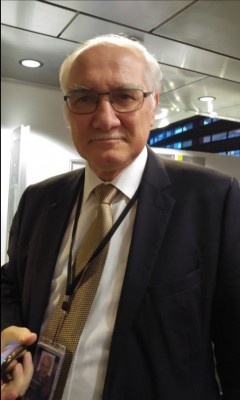
*Strasbourg/EU Parliament/Angelo Marcopolo/- The experienced President of EU Parliament's EPP Working Group on BioEthics, Miroslav Mikolasik, a mainstream MEP from Slovakia (current EU Chair for 7-12/2016), speaking to "Eurofora", anounced that a Special Conference, with a Hearing of Experts, on the Controversial and Unpopular Issue of "Surrogate Mothers" is currently prepared for the Forthcoming Plenary Session in Strasbourg, at the End of this Month, (24-27 October 2016).
Significantly, the move comes just after, in parallel, the PanEuropean CoE's Organisation for Human Rights, Democracy and Rule of Law, has had its Parliamentary Assembly's Social and Family Affairs Committee, chaired by mainstream Cyprus' MEP Stella Kyriakides, (from the Governing ChistianDemocrat/EPP Party DHSY), adopt in Paris a controversial Report on Surrogacy, drafted by Socialist MEP from Belgium, Petra de Sutter, which passed (as modified by Amendments) with only 1 Vote difference !
Experienced mainstream CoE Assembly's MEP, Valeriu Ghiletchi, a ChristianDemocrat/EPP from the Governing Party in Moldova, former Long-Time President of PACE's Social+Family affairs Committee, had already Warned "Eurofora", as Early as, since the Latest, June 2016, CoE's PanEuropean Parliamentary Assembly's plenary Session in Strasbourg, (Comp. "Eurofora"s various NewsReports from that PACE June Session, f.ex. at : ... + ... +..., etc), that such a Draft Report, was, in fact, Attempting to Open Breaches towards a Dangerous Spread, in real practice, of that Controversial and UnPopular, blatant Violation of Both Womens' and Childrens' Human Rights, which provoked also obvious Risks against Humankind, (mainly by facilitating Massive Genetic Manipulations of Human Embryos, Contrary to Natural Births), under the Disguise of some so-called "Childrens' Rights", which, in fact, were Exploited there as a Pretext.
CoE's Assembly has already Refused to Debate that Cotroversial Report, sending it Back to Committee last June 2016, and, in Theory, it could also do the Same this Time too,on its October 2016 Next Plenary Session, unless it managed to Heavily Amend it in an adequate way.
Doubts about Surrogate Mothers' Controversy reach even Socialist Politicians, as, f.ex., French President Hollande, who has, in principle, excluded that, at least until now, but also Prime Minister Vals, who has reportedly Changed Views on that "Hot" Matter, passing from an initialy "Laissez Faire" stance, towards a more or less Strong Opposition later-on.
For another, more Recent Question raised by "Eurofora" on a particular case about Surrogacy, judged this Summer by the French Supreme Admiistrative Court, and the reaction of International Institute for Human Rights "René Cassin"'s Head, and former ECHR President, Professor Costa, (who had just Highlighted relevant Challenges and Dangers raised by Bio-Technologies in such areas, See, f.ex. : http://www.eurofora.net/newsflashes/news/humanrightstopofficialonposthumnismandsurrogacy.html .
The forthcoming CoE Assembly's Plenary Session comes First, Next Week in Strasbourg, 2 Weeks Before the Next EU Parliament's Plenary here, scheduled for the Last Week of this Month (the BioEthics Meeting being, probably, scheduled for Wednesday, 26/10/2016), which holds, Exceptionaly, 2 Plenaries in 30 Days in Strasbourg, as Chairman Mikolasik reminded to "Eurofora".
CoE Local/Regional Democracy Watchdog's Chief Frecon to Eurofora on Ukraine Summit: Boost Dialogue !
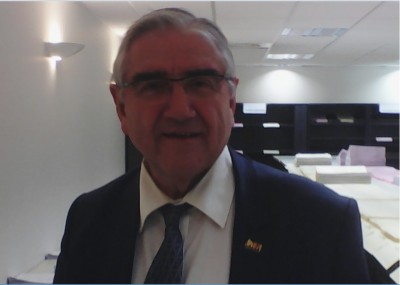
*Strasbourg/CoE/Angelo Marcopolo/- PanEuropean CoE's Watchdog on Local/Regional Democracy's President, experienced Senator Jean-Claude Frecon, from the Governing Socialist Party in France, speaking to "EuroFora" on the forthcoming Local/Regional Elections in Ukraine on October 2015, which are expected to be Crucial for the Peace process according to the Minsk Agreements, that a Quadrilateral Summit between the Leaders of France, Germany, Russia and Ukraine are due to thoroughly Examine in a Summit in Paris on Friday, endorsed the view that, if a Postponement of those Elections in the Autonomist Regions of Donetsk/Luhansk might Help to Start and Develop a real Dialogue between all sides involoved, on the concrete details of the Future Political Solution to the Conflict, then, that Proposal of Compromise reportedly made Recently by Representatives of those areas, might, indeed, become Helpful.
=> In fact, what is Essential to try to obtain in the forthcoming Summit for Ukraine, is to Boost a Dialogue among all sides involved, according to the Minsk Agreements, on the main oustanding issues, particularly concerning the imminent Local/Regional Elections, the Status of the DeCentralisation in the Donetsk/Luhansk Regions held by Autonomists, etc, he stressed to Reply to an "Eurofora" Question in Conclusion, (See Infra).
- "We (CLRAE) have already said that a kind of (Local/regional) Autonomy for those areas could be a Good Solution, in Ukraine as elsewhere, but, naturally, in the Framework of the Country's Territorial Integrity", President Frecon stressed from the Outset, as a matter of Principle.
-"This was inscribed (recently) in the Ukranian Legislation, even if some sectors of the Extreme Right, don't like it at all". CLRAE's Head observed, concerning some Troubles reportedly provoked after the Vote of a relevant Draft Law by the Ukranian Parliament, at a 1st Lecture, that President Poroshenko has strongly Condemned.
- "But what do they want, in fact : Return Back to the War ?", Jean-Claude Frecon wondered, reminding the Tragic Deadly and Destructive Ukranian Conflict which has stroke since February 2014 that formerly Peaceful European Country, provoking, according to Figures published at the Beginning of September 2015 by UNO's High Commissioner on Human Rights, at nearby Geneva, More than 8.000 Dead, and 17.810 Wounded Victims, many among them being simple Civilian People.
- "In order to Avoid War, trying to Help People Live Together, and start some Dialogue between them, Hoping that this Dialogue will be Conclusive" for the completion of a Political Solution, "it's simply Better to tell them (i.e. to the Donetsk/Luhansk Autonomists) that you Remain inside the Ukranian Country, but we (Kiev's Central Government) give you some Autonomy", he resumed in substance.
- At any case, "we, neither inside the CLRAE, nor in the Entire CoE, we are Not in favor of saying that, Today we have 47 Member Countries, but in the Future we might have, perhaps more than 50 or even 100 ! No, we (CoE) are Not at all for such a thing", he clearly underlined, adiopting a Critical stance vis a vis Various recent Trends, mutatis-mutandis, also in some Other European Countries, such as, f.ex. in UK's Scotland, Spain's Catalognia, etc., where Popular Referendums for Independence, or not, have been notoriously asked and voted, (however without obtaining yet any Majority of Votes in Neither among them)..
- Thus, "F.ex., among others, for Catalonia, it was said in substance that you are part of the Country (Spain), but you can Speak the Catalonian Language too". Also in Ukraine, "even if the Ukranian remains the Official Language of the Country, neverteless, in the Regions where the Large Majority of the Population are Russian-Speakers, they are told that they can Continue to use Both Languages, which, by the way, are Not so Differend between them....", he noted.
>>> Questioned by "EuroFora" about a Recent Proposal of Compromise, reportedly made earlier this Month, by Representatives of the Donetsk/Luhansk Autonomists, to eventualy Postpone for later-on, (f.ex. for February 2016), the Local/Regional Elections due to be held in that area, as also throughout the rest of Ukraine on October 2015, but apparently strongly Contested by Kiev's Central Government, which claims that the Conditions required for such an Election would Not yet exist, or not entirely fulfilled in the pro-Autonomists' areas, CLRAE's Head appeared quite Positive, but under one Key Condition ;
>>> - "If we can Hope that a certain Dialogue could be established, then, we have to Try that !", PanEuropean CoE's Watchdog for Local/Regional Democracy's experienced Head clearly advised, in reply to the above-mentioned "EuroFora"s Question.
- "F.ex., if they tell us that we need some Weeks or Months more, in order to hold a Dialogue, then, I think, that Naturally, this should be accepted", he resumed.
- "But we don't know yet" if it will work, or not. "So, what I'm advising, in substance, is, despite everything, to put, at least, a little of water in the wine", (typical French expression calling for Moderation), "Even if we didn't obtain something very Big" (in the key promise for a process of DeCentralisation of Power, in exchange of some other concessions from the Autonomists), "at least, we obtained Some Concessions". And, in general, in this as also in Other cases, "you never know if, what Exists Today, might Not Remain for Ever", he Warned all involved.
+ Meanwhile, "the CLRAE, which will hold its Next Plenary Session" in Strasbourg "in 3 Weeks" Time,is due to "Send a Team of about 30 Observers" for the forthcoming Local/Regional Elections in Ukraine, "and there are 10 People more, comming from the (CoE's) Parliamentary Assembly, who Asked to come Together with us", anounced to "EuroFora" the President of the PanEuropean Congress of Local and Regional Authorities (CLRAE). "Because we have a crystal-clear legal Mandate for that", he concluded.
=> Finally, expressing the Wish of PanEuropean CoE's Competent body for Local/Regional DeCentralisation and Democracy, from the forthcoming Quadrilateral Summit on Ukraine, scheduled for Friday, President Frecon stressed that, - "What We (CLRAE) want, First of all, is that they all Sit around the Same Table" for Peace Talks, as he pointed out.
- "So, at least the Russians and the current Ukranians Government should be there", together with France and Germany. And he acknowledged that, according to the Minsk Agreements, a "Dialogue" on certain Crucial Key points, must include also Representatives of all sides, i.e. also or the Donetsk/Luhansk areas held by Autonomists, (Comp. Supra).
-
- "Naturally, Yes. But we know that this will be Difficult. That's why, even if we might not obtain, right from the Start, a Full Negotiation, but, at least, a kind of Partial Negotiation, then, it could be OK for us", i.e. for the PanEuropean Organisation of Human Rights, Democracy and Rule of Law, i.e. the CoE, President Jean-Claude Frecon concluded in fine, as thing stand Today.
***
Main Menu
Home Press Deontology/Ethics 2009 Innovation Year EU endorses EuroFora's idea Multi-Lingual FORUM Subscribers/Donors FAQs Advanced search EuroFora supports Seabird newsitems In Brief European Headquarters' MAPs CoE Journalists Protection PlatformBRIEF NEWS
- 00:00 - 02.06.2021
- 00:00 - 18.10.2020
- 00:00 - 19.06.2020
- 00:00 - 18.05.2020
- 00:00 - 20.04.2020
- 00:00 - 02.02.2020
- 00:00 - 09.12.2019
- 00:00 - 27.11.2019
- 00:00 - 16.11.2019
Popular
- Yes, we could have prevented Ferguson riots says World Democracy Forum's Young American NGO to ERFRA
- Spanish People Elect CenterRIGHT Majority with 1st Party and Total of 178 MPs (6 More than the Left)
- Pflimlin's vision
- The European Athletic "Dream Team", after Barcelona 2010 Sport Championship Results
- Source Conseil d'Europe à ERFRA: Debatre Liberté d'Opposants à Loi livrant Mariage+Enfants à Homos ?
- Head of BioEthics InterGroup, MEP Peter Liese : "Embryonic stem cell research reaching its END" !?
- Spain: Jailed Turkish Terror suspect with Explosive,Drones,Chechen accomplices stirs Merah+ Burgas ?
- UN Head Ban Ki Moon at CoE World Democracy Forum : - "Listen to the People !"
Latest News
- Test Photos (f.ex.+ Invit to EU + Korea Peace meeting)
- EUOmbudsmen Conference 2022: Digital Gaps affect People's Trust threaten EF Project on EU Future ?
- French Election : Black Out on Virus, but Obligation for Fake 'Vaccines" Challenged
- Both French Presidential Candidates point at "Humanism" in crucial times...
- France : Zemmour = Outsider may become Game Changer in Presidential + Parliamentary Elections 2022
Statistics
Visitors: 62153309Archive
Login Form
Other Menu
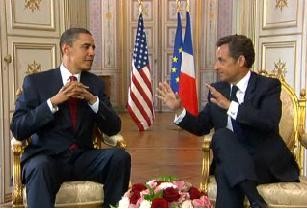
La Turquie, test-clé d'Independance de l'Europe face aux USA, les aménant de chercher en commun des nouvelles idées pour se mettre d'accord ?
Le débat, amical mais clair, entre les Présidents Américain et Français, Obama et Sarkozy, la veille des elections européennes du 7 juin 2009, a montré que la question controversée sur la démande de la Turquie d'entrer dans l'Europe est actuellement le point central et le test le plus pertinent de l' indépendance de la France et de l'Europe par rapport aux Etats Unis.
Les electeurs européens, aussi bien en France qu'ailleurs en l'UE, auront une seule chance à trancher, ce dimanche 7 juin 2009, en choisisant leurs eurodéputés pour la période 2009 - 2014, car après ca risque d'être trop tard, vu que tous ceux qui suivent les affaires européennes dépuis des décennies savent qu'en réalité, le moment des décisions sur la Turquie viendra au plus tard en 2013, date rétenue dépuis longtemps pour une importante révision des "Perspectives Financières" de l'UE qui reflètent des choix Politiques fondamentaux.
Le Président français, (récement encore représentant de l'UE, dans laquelle il joue un rôle important, ensemble avec la chancelière allemande Merkel, et autres leaders européens, ayant une influence notable auprès des Citoyens Européens, comme les derniers sondages montrent), réagissant à la repétition, par le nouveau Président Américain de la vieille position traditionelle de l'Washington poushant toujours vers la démande de la Turquie d'entrer dans l'Europe :
- "Je ne peut pas laisser détruire l'Europe, (qui) est un élément de stabilisation du Monde", réponda Sarkozy. "J'ai dit au Président Obama que pour moi il était très important que l’Europe ait des Frontières", a-t-il souligné, confirmant la position Franco-Allemande commune, récemment rappellée ensemble avec la Chancellière Merkel.
- "Il y a une différence (entre France/EU et les USA)... sur les modalités. La position traditionnelle des Etats-Unis d’Amérique, c’est l’intégration" de la Turquie au sein de l'UE. "C’était la position du Président Bush, du Président Clinton, de tous les présidents américains".
- "La mienne vous la connaissez : Ce n’est pas l’intégration dans l’Union Européenne. Mais j’ai proposé que nous réfléchissions, l’Europe, la Russie, la Turquie à la création d’un Espace Economique et de Sécurité en commun", a ajout Sarkozy rappelant son invitation de créer quelque chose de neuf et mieux adapté.
Mais, "cela ne veut pas dire qu’il faut repousser la Turquie dans les ténèbres. La Turquie est un allié dans l’OTAN, (et) une Passerelle entre 2 Mondes, voilà quelle est la meilleure modalité. C’est cela dont nous avons parlé", revela-t-il. Si "nous avons une Différence sur les Modalités, nous n’avons pas une différence sur l’Objectif : Faire de la Turquie un élément de Pont entre l’Orient et l’Occident", Sarkozy assura Obama.
- "Laissez-nous au moins une légère divergence sur un sujet, cela vous permettra de bien réfléchir pour les prochaines échéances", ajouta Sarkozy en réponse à un journaliste de l'opposition Socialiste qui avait soulevé la question de la Turquie, en la melant (comme un lobby turc notoirement essaie de faire pour exploiter la manipulation de quelques Arabes, la Civilisation Historique desquels fût pourtant detruite par l'ex-empire Ottoman-Turc) avec une question tout à fait différente : celle de la voile islamique (!), avec laquelle elle n'a rien à voir.
- "Sur la Turquie, Monsieur, vous appartenez à un journal ...qui a appelé à voter, au moment de la présidentielle, pour mon adversaire.... Quel était votre argument à ce moment-là ? Vous disiez : « Attention, Nicolas Sarkozy va trop s’aligner sur les Etats-Unis d’Amérique », et je vois que deux ans après vous dites : « Ah, il y a un sujet sur lequel le Président Obama et le Président Sarkozy ne sont pas d’accord » Cela devrait vous rassurer, Monsieur" , réponda-t-il, en faisant sourire même le président américain, (et laissant entendre que trancher définitivemen la controverse sur la Turquie pourrait être au coeur de l' Elections Présidentielle en France pour 2012 )
-------------------
- "Ce que les Etats-Unis peuvent faire, c’est encourager ....TOUT PROCESSUS qui permettra à la Turquie d’être convaincue qu’elle a des amis, que ce soit la France, les Etats-Unis ou l’Europe", réponda Obama, apparamment n'excluant pas, a priori, le point de Sarkozy sur la création d'un espace commun d' économie et sécurité entre l' UE, la Turquie et la Russie (v. supra).
"Les Etats-Unis ne sont pas membres de l’Union Européenne, nous ne pouvons pas dicter si un pays quelconque adhère ou n’adhère pas à l’UE"; Obama a admis, parlant de la "Turquie, (sur laquelle) le Président Sarkozy et moi nous sommes entretenus sur ce dossier avant". "Maintenant le Président Sarkozy représente un Etat membre de l’Union Européenne et il a une position différente", opposée à démande turque d' entrée dans l'UE.
"La Turquie par contre est un allié de l’OTAN très important. ...La Turquie a fait connaître son intérêt à une intégration croissante avec l’Europe et nous (USA) encourageons cette attitude. J’ai souvent dit que l’adhésion de la Turquie à l’Union européenne serait importante".
"Mais, (en tout cas) je crois qu’il est important de noter que le Président Sarkozy appuie fortement le travail que la Turquie fait au sein de l’OTAN et je crois qu’il s’intéresse à une intégration économique plus intense avec la Turquie". (Ce qui pourrait se faire, justement, avec un "parténariat privilegié" adéquat et/ou l'idée de créer un espace commun EU - Turquie - Russie : V. supra).
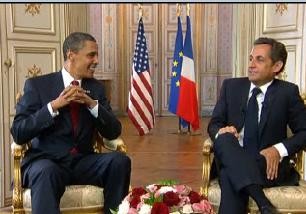
Est-ce que l'effort du Président de la France, soutenu par la chancelière Allemande et l'opinion publique de la plupart des Citoyens Européens la-dessus, de trouver un accord entre l' Europe et l' Amérique sur la Turquie, en proposant de sortir des chemins battus et créer du neuf, en etablissant "un Espace Commun d' Economie et Sécurité" (v. supra), suffira de calmer un lobby traditionaliste à quelques bureaucrates de Washington DC, datant dès l'époque de l' ex-"Guerre Froide", beaucoup plus ancien que le nouveau Président vénu de l' oxygen des "grands lacs" près de Quebec du Canada : Chicago, connu comme "la ville du vent" nouveau ?
-----------------------------------------------------------------------
Le Prémier Ministre Fillon appele à "faire vivre le Rève Européen"
------------------------------------------------------------------------
Seul l'avenir le dira. Mais, entre-temps, l' Europe ne peut plus attendre et perdre encore plus du temps et d'energie vitale sur la démande controversée de la Turquie, qui a notoirement menacé d'arrêter l'édification européenne dépuis 1999-2005 :
Comme le Premier Ministre François Fillon a clairement dit, un peu plus tôt cette semaine, dans un discours éloquent sur les enjeux de l' Election Européenne de ce juin 2009 (V. résumé envoyé aux adhérents d'"EuroFora"),
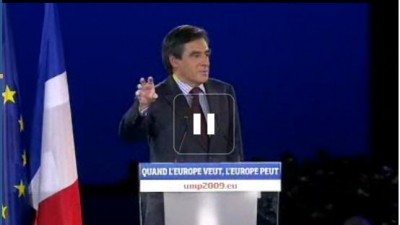
- "S' abstentir, c'est laisser à la Technocratie le pouvoir de dominer" la vie des Citoyens européens, qui devraient prendre l' Europe en branle le corps", et commencer d'agir par toutes les voies politiques démocratiques, prennant conscience que "l' Europe c'est Nous, (i.e. les Citoyens), et "Pas eux !" (i.e. les Technocrates), selon une image symbolique.
- "Je me souviens de l' Europe obligée de faire Silence, (au Passé), quand "les Grands" décidaient de son sort", rappela Fillon. "Je me souviens de l'Europe divisée, de l' Europe dominée" par d'autres, '"de l'Europe appauvrie""Je me souviens de Berlin occupé, muré, divisé comme un butin qu'on tire aux dès. Je me souviens du Silence de Varsovie. Je me souviens du Silence de Prague"..
- "Nous, les Européens, nous avons bien failli sortir de l' Histoire, et dévenir, pour du bon, les dès d'un jeu joué par d'autres".
- "C'est pourquoi je ne peux pas concevoir une Europe qui ne serait pas Souveraine, une Europe qui ne serait pas Maitresse d'êlle-même", aujourd'hui et démain, martella-t-il. "Le Monde s'est habitué trop longtemps à une Europe faible, que l'on pouvait traiter avec condescendence".
- "Le moment est venu de rélever le défi : Le moment est vénu de montrer que, nous les Européens, avons décidé d'être débout, et d"être nous-mêmes".
"Dépuis 2 ans (i.e. dès les Elections Présidentielles de 2007), avec Nicolas Sarkozy, nous avons oeuvrer pour relever notre Identité Nationale (de la France), dont nous sommes fiers. Et bien, l'' Identité Européenne mérite tout autant, elle qui prolonge les Génies de nos Nations".

- "Je crois à la présence d'une Civilisation Européenne", déclara Fillon, largement applaudi par des milliers de personnes ayant entendu une série des Musiques entremelées characteristiques de differents pays européens, et des images lumineuses géantes avec des extraits symboliques de Goethe, de Victor Hugo, de Shakespeare, et d'autres auteurs italiens, espagnols etc celebres à travers l'histoire.
- "L' Humanisme, la tolerance, la Liberté de la Conscience. La Solidarité. L' Etat de Droit. La confiance placée dans la Science, l' Innovation, le progrès. Toutes ces Valeurs, elles disent clairement où commence et où s'épanuit cette Europe" que nous voulons, observa-t-il.
En harmonie avec les positions soutenues par le Président du Parlement Européen, eurodéputé allemand, Hans Gert Poettering, et la Chancelière allemande, Angie Merkel, sur la "Dignité Humaine" au coeur des "Valeurs de l' Europe" moderne. Ce qui fait qu'" avec un Elargissement sans fin", même vers la Turquie, c.a.d. "sans Frontières, l' Europe Politique, l' Europe des Valeurs et l' Identité européenne" ne peuvent pas exister, comme a dit aussi le Président francais, Nicolas Sarkozy, recemment à Berlin.
Fait important : Cette observation de Fillon a été faite le jour-même que le Comité des Ministres du Conseil de l'Europe à Strasbourg concluait une semaine de réunion semestrielle sur les Droits de l'Homme, qui a examiné un grand nombre d'affaires des pires Violations (pex. Tuéries scandaleusement non elucidées, Persecutions et privations arbitraires de Liberté, personnes portées "Disparues", Tortures et "traitements inhumains et degradants", Usurpations illégales des Maisons et Patrimoines privées de Réfugiés, etc., pour lesquelles la Cour Européenne a condamné la Turquie dans plusieurs jugements, dont on attend toujours l' application)...
- "C'est pourquoi un Elargissement sans fin de l' Europe ne peu pas être un objectif en soi. Parce qu'il ne peut que diluer l' élan européen, et detruire l' Idéntité Européenne"
-" Voilà pourquoi nous disons, très sereinement, que nous ne sommes pas favorables à l' adhésion de la Turquie dans l'UE", conclua le Premier Ministre de la France; largement applaudi par des gens qui soulevaient le drapeau européen.
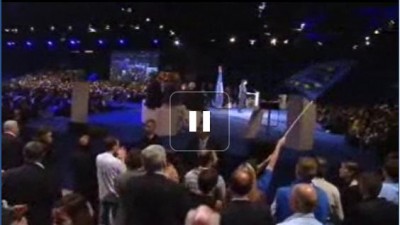
"Ce n'est pas un Slogan de meetings. Ce n'est pas la marque une "Hostilité" au régard de cette grande Nation (i.e. la Turquie), qui doit être étroitement associée à l' UE", pex. par un partenariat priviliegié, ou une autre formule adaptée.
- "Mais il lui faut des Frontères à l' Europe, il lui faut des Frontières stables, qui lui permettent de renforcer son Unité et son Identité", a-t-il expliqué.
- "Alors, c'est au nom de cette Europe charnelle, que je m'engage avec vous. Mais, cette Europe-là, ne peut avancer qu' à une seule Condition : celle de l' Europe Politique".
"Nous avons longtemps douté qu'elle soit possible : Aux années 1970, Henri Kissinger (le notoire ex- Secretaire d'Etat Américain aux affaires etrangères, consideré, à tort ou à raison, comme chef d'orchestre du renversement du Président Allende en Chili, de l' invasion militaire de la Turquie à Chypre, etc), disait, avec une ironie blaissante : - "Ah, l' Europe ? : Quel numero de Télephone ?..." Pendant les 6 mois de la présidence française de l'UE, (7-12/2008), Henri Kissinger n'aurait aucune difficulté de rejoindre l' Europe !", observa-t-il en suscitant des nouveaux applaudissements nourris.
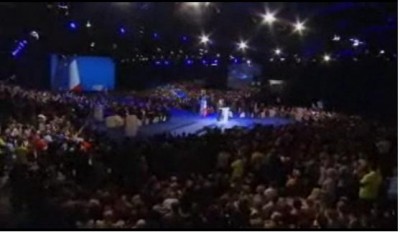
"J'au vu l' Europe Politique se dresser, et prendre ses responsabilités : L' Europe Politique c'est celle qui agit sans délai, et avant les Etats-Unis, pour stopper des faillites Bancaires qui s'enchaînent, qui nous auraint plongés dans une Depression pire que celles des années 1929. L' Europe Politique est celle qui, maintenant, doit mettre un fin à un Capitalisme Financier, qui a perdu sa boussole. L' Europe Politique est celle qui a réussi d'etablir le règles les plus ambitieuses au Monde dans la lutte contre le rechaufement Climatique. Samedi, nous celebrons l' anniversaire du debarquement de la Normandie, où nos amis Américains ont pris une part décisive à nôtre libération. Mais, en décembre 2009, à la Conference (Mondialle) de Copenhague, c'est nous les Européens, qui allons leur montrer le chemin vers cet avénir commun" pour la sauvegarde de l'Environement naturel. L' Europe Politique c'est celle qui, en août 2008, lorsque la Guerre faisait rase entre la Russie et la Géorgie, s'est interposée pour imposer la Paix. Et c'est elle qui doit, maintenant, se doter des moyens Militaires de se défendre par elle-même, pour elle-même", ajouta-t-il en évoquant clairement la création d'une Défense Européenn Autonome.
"L' Europe Politique c'est celle qui doit bâtir des grands champions Industriels Européens, comme nous avons fait, auparavant, pour (l'avion) Airbus ou (la fusée) Ariadne. C'est celle qui doit exiger la Reciprocité dans les rlations Commerciale avec nos grands partenaires", sans Dumping Social ou Environmental, ni autre Concurrence Deloyale. "C'est celle qui doit se doter comme objectif d'être "le Continent de l'Esprit", réunissant les plus grandes Universités du Monde, en multipliant les Connexions, entre Scientifiques et étudiants."
"Nous respecterons nos engagements, jusqu'au dernier", souligna le Premier Ministre de la France, peu après que les candidats-eurodéputés de la coalition Gouvernementale (UMP : Mouvement pour la Majorité Présidentielle) ont signé solennement, devant plusieurs milliers des Citoyens, une spectaculaire pancarte-géante avec "7 engagements" pour les Elections Européennes du 7 juin, auxquels figure aussi l'engagement de "s'opposer à l' adhésion de la Turquie dans l'UE".
- "Parcque ce respet des engagements est une exigence si nous voulons rétablir la Confiance entre les Responsables Politiques et les Citoyens", conclua Fillon, la veille de ces Elections Européennes de juin 2009, après les Abstentions Majoritaires de 1999 et 2004, suivies de 3 "NON" à 3 Euro-Réferenda dépuis 2005, (dates auxquelles, quelques gouvernements du Passé, avaient donné le statut d'un "Candidat" et commencé des "Négotiationa d'adhésion" avec la Turquie, suivies d'un blocage sans précedent de l' édification européenne)..
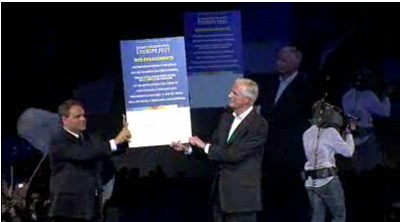
"Nore Europe n'est pas n' importe quelle Europe : L' UE Technocratique n'est pas la nôtre. ... L' UE sans Frontières n'est pas la notre. L' UE desincarnée n'est pas la notre". "Nous portons une idée de l'Europe" qui "n'est pas celle des Statistiques et des Bureaux(crates). L'Europe ce n'est pas qu'une Monnaie. Ce n'est pas qu'un Marché. économique".
- "L' Europe c'est d'abord une Culture. L'Europe c'est une Histoire", a-t-il dit, largement applaudi.
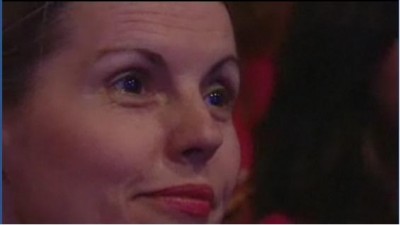
"L'Europe c'est une rencontre entre des Nations qui sont Millénaires et qui sont Brillantes. L'Europe c'est Paris. C''est Madrid. C'est Prague. C'est Londres. C'est Rome. C'est Varsovie. C'est Berlin. C'est Vienne. C'est Athènes : Quant on énonce ces Villes, alors on "sent" nos Héritages et nos Cultures entremelées qui circulent dans nos veines".
- "Je suis Européen, parcque profondément Français, je sais ce que je dois aux influences de l' Atlantique et de la Méditerannée. J'aime ces Traditions qui offrent à chacun des nos Nations leur éclat. .. J'aime ses saveurs, ses paysages divers. Ils sont également miens, ou, plus précisement, je suis également fait d'eux. Je suis Européen, car, Français, j'aime l' Europe ouverte vers l' Amérique, vers l'Orient, vers l' Maghreb. J'aime les quais de Vénise, ceux d'Amsterdam. J'aime les quais de Thamise où sont vénues pendant des siècles s'amasser les richesses et les nouveautés du Monde. J'aime l' Europe curieuse. L'Europe qui rêve des lointains : L' Europe de Vasco de Gama, de Magelan. de Bougainville, de Charcot, de Monot... Cette Europe qui, aujourd'hui, s'élance vers l' Espace. Je suis Européen parce que Français, j'aime l' Europe qui prospère et qui invente. J'aime l' Europe des Trains à Grande Vitesse. J'aime l'Europe des Satellites et des Fusées. L'Europe de la Mode et des Atéliers d' Artistes. L'Europe des Grands Laboratoires, des Ingéniers. des Entrepreneurs, des Grands Architèctes, des Traditions Ouvrières. Comme rançais, j'aime l' Europe qui dit "NON" à la Tyrannie et qui se soulève à l'appel de la Liberté", a-t-il dit en
"Je me sens lié à ces femmes et ces hommes sans nom, qui ont levé la tête, et qui ont sécoué le joug sous lequel .. on les avait fait pliér", dit-il en évoquant pex.. la Révolution Française de 1789, le Siècle des Lumières, l'appel du Général de Gaulle contre l'Occupation NAZI, et les pires heures obscures qu'un "Fascisme" ou "Communisme" devoyés, suivies de la Guerre Froide avaient plongé l'Europe au Passé.
"Ils sont des millions, ces Héros Anonymes de notre temps, que nous croisons sans le savoir dans nos rues et nos places. Et je ne peux pas concevoir l'Europe sans eux, et sans tous ceux qui poursuivent leur combat contre l'arbitraire et le fanatisme", ajouta Fillon. Faisant pex. rappeler un récent Film allémand, primé au Festival de Vénise, qui décrivait la vie d'un cadre à l'époque d'un régime oppressif, qui avait été chargé d'espioner la vie privée et familiale d'un couple soupçonné d'être dissidents politiques, mais, ému par leur honnêteté humaine et leur sacrifice pour sauver d'autres, a preferé risquer sa place et sa propre liberté pour les sauver, sans même qu'ils le sachent, condamné dépuis à faire un bas boulot d'anonyme perdu dans la foule..
"Quand je vois l'Europe moderne, je vois les résultats de l' Audace de ces hommes qui ont brisé les traditions de conflit et de violence. Je vois des nations soudées autour d'une monnaie unique et protectrice. Je vois 27 jeunesses appelées de grandir ensemble, sans défiance. Je vois 27 peoples unis, qui nous interdisent de jouer les blazés ou les indifférents".
Jettant "un régard lucide sur les errements de la construction européenne", Fillon a observé que "l' Europe n'a pas bésoin d'être idélisée pour être ce qu'elle est ; Cad. une aventure humaine, avec ses faiblesses et ses forces".
"Vous voulez que l' Europe agisse ? Fixez-lui des objectifs clairs. Vous voulez la Démocratie ? Agissez en Citoyens. Vous rédoutez la prétendue Bureaucratie des Bruxelles ? Alors renforcez, par votre Vote, les instances élues au Parlement Européen" qui sont chargés de la contrôler.
- "Si nous voulons faire vivre "le Rêve Européen", .. alors nous avons tous le dévoir de l' engagement", a-t-il conclu, appelant de "engager pour le drapeau tricolore et le drapeau étoilé, car ils symbolisent tous les deux la fierté de nôtre nation et la force de nôtre union".










